WHAT HAVE WE DONE, WHERE WE ARE AND WHERE ARE WE GOING WITH CLIMATE CHANGE? (P. 06)
ACRE AND OTHER STATES IN THE AMAZON SUFFER FROM THE CLIMATE EMERGENCY (P. 17)
• ART MOOD (P. 33)
• VOICES AROUND THE WORLD (P. 36)
• CLIMATE XIBÉ (P. 66)
Issue 1 • June 2023
MAGAZINE
Voices Magazine is a publication of the Voices for Just Climate Action (VCA) Program in Brazil. VCA is a global alliance conceived by six civil society organizations: Akina Mama wa Afrika, Fundación Avina, Hivos, Shack Dwellers International (SDI), SouthSouthNorth (SSN) and WWF. The initiative is funded by the Ministry of Foreign Affairs of the Netherlands.
In Brazil, the Program is coordinated by Fundación Avina, Hivos, the International Institute of Education of Brazil - IEB and WWF - Brazil, supporting 70 organizations, movements, and collectives, structured in 13 Coalitions.
Would you contribute, support, participate and get involved with the magazine and the Program?
Send an e-mail to comunicacaobr@ voicesforjustclimateaction.org
issue 1
June | 2023 editorial
Adriano Maneo, Alice de Matos Soares, André Franco, Angélica Mendes, Ingrid Barros, Jamille Santana, Jonaya de Castro, Kamila Mayara Sampaio Souza, Lindon Johnson Pontes Portela, Lucidalva Cardoso do Nascimento, Martha Fellows, Maurício Alves de Sousa, Raimundo Alves, Raimundo Carlos Ferreira Alves, Rede de Jovens Comunicadores Indígenas da Coiab, Rede Jandyras, Rogenir Costa, Rose Farias, Samela Bonfim e Silvana Bastos.
Collaborators
Alana Manchineri, Alice de Matos Soares, Andreia Bavaresco, Angélica Mendes, Dalissa Cabral, Digo Amazonas, Ediclea Araújo, Ellen Acioli, Fábio Pena, Gabriela Yamaguchi, Iracema Marques, Juliana Lício, Juliana Strobel, Marcelo Doroso, Muy Waso (Bolívia), Natália Maia, Paula Moreira, Raimundo Carlos Ferreira Alves, Rogenir Costa, Trícia Oliveira e Waleska Queiroz.
Revision
Adriano Maneo, Andreia Bavaresco, Angélica Mendes, Ellen Acioli, Gabriela Yamaguchi, Juliana Strobel, Marcelo Doroso, Natália Maia, Paula Moreira, Rogenir Costa e Trícia Oliveira.
Editing
Adriano Maneo
Translation
Lílian Folchini
dESIGN jamboestudio.com
Illustration and Infographics
Bruna Bastos e Reg Coimbra
Photography
15 Segundos Informativos, Adriano Maneo, Caetano Scannavino, Catraia Filmes, Coletivo Audiovisual Daje Kapap Eipy Munduruku, Dalissa Cabral, Escola de Ativismo, Ingrid Barros, Jander Manauara, Jussara Salgado, Marcelo Dagnoni, Moisés Muálem, Negritar Produções, Open Knowledge BR, Rede de Jovens Comunicadores da Coiab, Sara Tamioso/Kiw Assessoria e Suraras do Tapajós. www.voicesforjustclimateaction.org

Welcome to
In this space, the voices of those who fight for climate justice in the nine states of the Legal Amazon echo louder!
At Voices, you will find articles, essays, interviews, and reports produced by those who live the realities of the Amazon and fight for its conservation. These are stories of resistance that do not usually gain space in the mainstream media, but which are fundamental for us to understand the complexities of the largest biome on the planet and the people who live in it.
The content you will find on the following pages is made collaboratively by a network of organizations and movements that believe the fight for standing forests is a fight for life, human rights, and climate justice. Here you will be able to understand how activists, young people, women, social movements, Indigenous peoples, traditional peoples, academics, and civil society organizations have been working to build a new development paradigm that is so necessary to face the climate emergency starting in the Amazon.
Voices is not another publication about climate change. We are the voices of local communities that suffer directly from deforestation, land grabbing, contamination of rivers, and violence in the field. We are the voices that represent traditional and ancestral climate solutions which have kept the forest standing until the present day. We understand that the defense of the conservation of the Amazon is also the defense of the guarantee of human rights and dignity.
We will not remain silent in the face of the threats that hang over the Amazon and its people. We will not let economic interests destroy a heritage that belongs to all of us. Furthermore, we are here to fight, resist and denounce, but also to show that those who contribute least to the climate emergency are those who suffer most from it and those who have the solutions to combat it.
Welcome to Voices, the magazine that echoes the fight for climate justice! Join us and assist in spreading these Voices around the world!
6
What have we done, where we are and where are we going with climate change?
By IEB e IPAM
9
17
INSTITUCIONAL For Just Climate Action
Voices for Just Climate Action (VCA) Program, implemented in seven countries in the Global South, brings together 70 organizations in Brazil over 13 different Coalitions.
By VCA Brazil
OPINION
Acre and other states in the Amazon suffer from the climate emergency.
By Angélica Mendes
18
22
NETWORK ACTIONS
Climate Authorities
Indigenous climate authorities discuss Climate and REDD+ for groups that keep forests preserved, in a meeting held by COIAB and IPAM.
By Advocacy Coalition of Indigenous Peoples for Climate Justice
OPINION
COIAB’S Letter
Final document of the meeting on climate and mechanism of REDD+ for indigenous peoples of the Amazon.
25
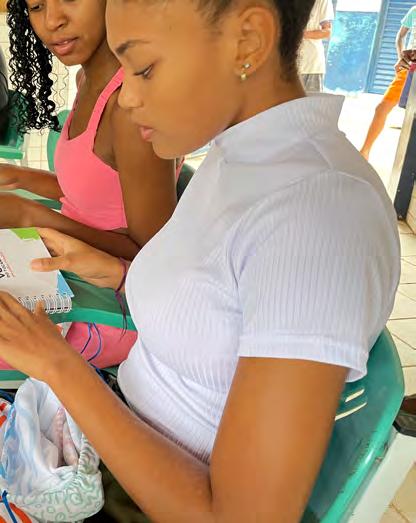
NETWORK ACTIONS
Communication & climate justice
Intercultural training in climate justice for young quilombolas, indigenous people, fishermen and family farmers in Tocantins.
By Silvana Bastos
28
NETWORK ACTIONS
Data for Climate Action | How the open data ecosystem can transform the narrative about the Amazon
By Jamile Santana
31
NETWORK ACTIONS
Art in fight | The unavoidable future of oil is underground, the unavoidable future of the forest is standing upright
By Jonaya de Castro
33
ART MOOD

Click to browse
This edition
43
Foot grounded, voice raised Reference activists from three countries tell their experiences and actions for climate justice.
Voices at COP27 | 27@27 Contest took 27 voices from the Global South to reinforce the need for accelerated and accessible climate finance.
By VCA team
Un 2023 Water Conference | Vozes do Tapajós Coalition puts the struggle of the Munduruku for clean water in villages affected by mining amidst the global debate.
By Samela Bonfim
Voices from the Gran Chaco
VCA team

45
48
NETWORK ACTIONS
Tapajós on screen | With cameras and cell phones, young people from Tapajós show the impacts of climate change on their territories.
By Samela Bonfim
NETWORK ACTIONS
Youth on the move | Young people from Acre join to form the Comunic(A) tiva Network Coalition to promote communication and activism in the socio-environmental struggle.
By Rosa Farias
52
55
NETWORK ACTIONS
From here, I disappeared for you, in 2050 | Jandyras Network highlights the risks of climate emergency in Belém and shows the urgency of incorporating the climate agenda into municipal policies.
By Rede Jandyras
NETWORK ACTIONS
Development & involvement and popular resistance
Representatives of territories and social movements in Maranhão state debate the climate crisis and collective resistance.
By Ingrid Barros
58
61
NETWORK ACTIONS
Amazonian militance
Engagement and strengthening of Social Movements in defense of the Tapajós river.
By ESMA E MTV
NETWORK ACTIONS
Activists wanted | The first activism award in Brazil maps and makes actions visible, encourages social participation and shows the new activist faces of the country.
By Megaphone Activism Coalition

NETWORK ACTIONS
Climate & Cities | The collaborative compilation of the Infographic on climate change and the urban agenda
By Amazonic
Voices Coalition: Urban Engagement on Climate Change
63 66
VOICES AROUND THE WORLD
36 38 40
By VCA team
By
CLIMATE XIBÉ
What have we done, where we are and where are we going with
CLIMATE CHANGE
Instituto
WHAT DOES THE
SAY IN ITS LATEST REPORT?
Climate change is a threat to human well-being and the health of the planet.
Human activities are the unequivocal cause of climate change, through the Greenhouse Gas Emissions (GGE) mainly.
Policies and laws dealing with mitigation have expanded consistently since the penultimate IPCC report, in 2014.
Although many coping actions are already being put into practice, there are still gaps to be filled with adaptation Climate change is at the root of many extreme events in all regions of the world, such as river floods and landslides, droughts, heat waves and increased occurrence of fires in areas where fire has historically been unnatural.
Global financial support to implement adaptation plans has been insufficient, restricting the implementation of these actions, especially in the countries of the Global South.
The communities most exposed to these extreme events are those that have historically contributed the least to current climate change.
Even if countries fulfil their 2030 pledges, it is still likely that the temperature will exceed the 1,5°C increase during the 21st century, which means further diminishing the chances of limiting the temperature rise to 2°C.
6 voices magazine #1
Click to browse
By
Internacional de Educação do Brasil - IEB and Instituto de Pesquisa Ambiental da Amazônia (IPAM)
IN THE PERIOD 2011-2020 REACHED
ABOVE THE 1850-1900 AVERAGE.
HISTORICAL, ONGOING, AND UNEVEN CONTRIBUTIONS TO GREENHOUSE GAS EMISSIONS
• Unsustainable energy use;
• Land use and land use change;
• Lifestyles and patterns of consumption and production, in all regions.
GREENHOUSE GASES EMISSIONS
FUTURE CLIMATE CHANGE, LONG-TERM RISKS, AND RESPONSES
EMISSIONS
CLIMATE RISKS
CLIMATE CHANGE
NON-CLIMATE RISKS
Deep, rapid, and sustained mitigation, the accelerated implementation of adaptation actions involving the recovery of socio-ecosystems in this decade would reduce losses and damage predicted for the near future and registered in the presence of diverse communities and natural environments.
MORE COMPLEX RISKS TO MANAGE LOSS AND DAMAGE
BY SECTOR: BY COUNTRY: BY INCOME
1º China - 37% 2º USA -18% 3º India - 10% 4º EU - 9,7% 5º Indonesia - 6,1% 6º Russia - 5,9% 7º Brazil - 4,5%
WORLD BRAZIL 73.2% 18.4% 5.2% 3.2% 18% 73% 5% 4%
SEEG (2020)
Climate Watch (2020) (electricity, heating, and transport) Energy Industry Waste (deforestation and degradation) Agriculture and land use voices magazine #1 7
10% richest of emissions of emissions are responsible foR 34 TO 35% income are responsible 13 TO15% with the lowest
By Climate Watch (2019)
Source:
Source:
1,1ºC GLOBAL TEMPERATURE
WE NEED TO ZERO ALL GGE EMISSIONS NOW!
THE TIME IS NOW!
The choices and actions implemented in this decade have impacts now and for thousands of years.
FOR THAT IT IS NECESSARY INTERNATIONAL COOPERATION, CLIMATE RESILIENCE
>>> Integrates adaptation and mitigation actions to promote sustainable development for all; and
>>> respects and recognizes diverse knowledge as fundamental to reverse the climate crisis
better access to adequate financial resources, especially for regions, sectors and groups exposed to the impacts of climate change and therefore vulnerable
• Inclusive governance
• Coordinated policies
• Fast, far-reaching transitions across industries and systems
Viable, effective, and low-cost options for mitigation and adaptation are now available, with differences between systems and regions.
Prioritizing equity, climate justice, social justice, inclusion and just transition processes can enable adaptation, ambitious mitigation actions and climate resilience. Adaptation outcomes are enhanced by increased support for the regions and people most exposed to climate risks.
CLIMATE JUSTICE IS ABOUT HUMAN RIGHTS!
All modeled global paths that limit warming to 1.5°C (>50%) with no or limited overshoot, and those that limit warming to 2°C (>67%), involve rapid and deep reductions and, in most cases immediate, greenhouse gas emissions across all sectors in this decade (IPCC)
THE WINDOW OF OPPORTUNITY TO SECURE A LIVABLE AND SUSTAINABLE FUTURE FOR ALL IS RAPIDLY CLOSING
FINANCE, TECHNOLOGY, AND INTERNATIONAL COOPERATION ARE KEY ENABLERS FOR ACCELERATING CLIMATE ACTION
To achieve climate goals, funding for adaptation and mitigation needs to be increased many times over. There is enough global capital to close the global investment gaps, but there are barriers to redirecting capital towards climate action.
This infographic has been produced with information form the latest IPCC report, published in March, 2023.
8 voices magazine #1

For climate Action JUST
Voices for Just Climate Action (VCA) Program, implemented in seven countries in the Global South, brings together 70 organizations in Brazil over 13 different Coalitions
the climate emergency we are experiencing has already resulted in a global temperature increase of 1.1 °C average since the Industrial Revolution. Though this number may seem low, it has generated extreme weather events that impact people and communities around the world. Scientists predict that over 100 million people will be forced into poverty by 2030 due to climate change. This crisis affects human rights and increases the vulnerability of already marginalized groups, deepening existing social and economic inequalities.
To face this critical scenario, civil society must have a voice in local, regional, and global decisionmaking on the climate agenda. The transition to a low-carbon emission development model is a political process that must be fair and inclusive,
and that requires innovation and collaboration between various actors and social movements. It is in this context that the Voices for Just Climate Action (VCA) Program operates, a global alliance created by six organizations: Akina Mama wa Afrika, Fundación Avina, Hivos, Shack Dwellers International (SDI), SouthSouthNorth (SSN) and WWF. The initiative is funded by the Ministry of Foreign Affairs of the Netherlands.
In a global scenario of climate injustice, where the so-called “less developed” nations of the Global South are the ones that contribute the least to climate change, whilst they are the ones that suffer the most from its effects, the Program has defined its area operations in seven countries: Brazil, Bolivia, Indonesia, Paraguay, Kenya, Tunisia and Zambia.
“It is important to understand the perspective of the climate agenda from the narrative of those who suffer the most, promoting a collective and representative construction of concepts on the theme of climate change based on the different voices of the impacted territories, thus promoting a sense of belonging to the discussion and opening doors for more participatory dialogue,” says Ellen Acioli, from Fundación Avina and VCA program coordinator.
In Brazil, the program is coordinated by a regional team composed of Fundación Avina,
 Representatives of the 13 coalitions, the VCA Brazil Regional Team and VCA Brazil Regional Team and Global VCA during the II VCA Brazil Partners Forum. Photo: Negritar Produções
Representatives of the 13 coalitions, the VCA Brazil Regional Team and VCA Brazil Regional Team and Global VCA during the II VCA Brazil Partners Forum. Photo: Negritar Produções
the International Institute of Education of Brazil - IEB, Hivos and WWF-Brazil. The VCA Network in the country is currently comprised of 70 organizations that are arranged in 13 coalitions with different approaches and expertise.
“Decentralization in decisionmaking for the implementation of VCA resources, through partnerships, is of paramount importance for the protagonism and increase of leadership in the program”, says Paula Moreira, engagement manager at Hivos in Brazil.
Mídia Ninja Anmiga
Conselho Nacional das Populações Extrativistas Activist Forest Amazon
PyData Manaus
PyLadies Manaus
InfoAmazonia
Casa Preta
Open Knowledge
Brasil
Ass. dos Moradores e Produtores da Resex Chico Mendes em Xapuri
STTR- Brasiléia
Casa Ninja Amazônia Liga de Quadrilhas Juninas do Acre
CNS
Youth Comunic(A)ctive Network
Comitê
Chico
Mendes
Avina
INDIA / Coletivo Puraqué
Strengthening of the data and innovation ecosystem in the Brazilian Amazon
Artigo 19
Perifa Connection
our network
Mandí
Clima de eleição
Movimento Moara
#ShareInformation
#ShareDemocracy
WWF Brasil VAC braZil Regional Team
IEB
UMIAB IPAM
OPIROMA
ARPIT
CIR
Jandyras Environmental Ariculatores Network
FEPIPA
Indigenous Peoples Advocacy for Climate Justice
FEPOIMT
Quadrilha Malucos na Roça
Hivos
COIAB
APOIANP
FOCIMP
FOIRN
COAPIMA
10 voices magazine #1
Tapajós Vivo - MTV
Escola de Ativismo
Tapajós de Fato
NÓS - EDUCATION, COMMUNICATION AND POPULAR MOBILIZATION IN DEFENSE OF JURUENA AND TAPAJÓS RIVERS BASINS
MAM - Baixo Tapajós/ Amazonas
Rede Juruena Vivo
Ass.
Cultural Kyjre - Povo Kraho
Ass. Onça D’água
Ass.
Indígena Pyka Mex (Apinajé)
ISPN
Voices of Tapajós Fighting Climate Change
Megaphone Activism
Amazon Voices: UrbaN Engagement in Climate Change
Greenpeace ISA Engajamundo
Pimp my Carroça
Climate Change
Spawning: Women and Youth Swimming
Countercurrent
Rede INTERAÇÃO
SOMECDH
UFTO Campus Arraias AKMT
MST Tocantins
EFA do Bico do Papagaio Voices of Tocantins
Colônia de Pescadores e Pescadoras de Araguacema
COOPTER
Saúde e Alegria STTR - Santarém
CITA
SAPOPEMA

CITUPI
Col. Audiovisual Munduruku
Daje Kapap Eypi
GEDMMA
Equit
FPMM
CPCDDH Padre Josimo Coletivo Mulheres do Xingu
Agroecology for protection of Amazonic Forests
ACESA
Suraras do Tapajós
RAMA
Ass. Justiça dos Trilhos
Tijupá
voices magazine #1 11
12 voices magazine #1 13 24.386 Reserva extrativista Tapajós Arapiuns Reserva extrativista Chico Mendes Quilombo Kalunga do Mimoso Rio Andirá Quilombo Belém Porto Velho Reserva extrativista Mata Grande Macapá SÃO LUÍS PALMAS CUIABÁ RIO BRANCO Manaus TI Apynaé TI Kraolandia Maranhão Pará Amapá Roraima Amazonas Acre Rondônia Mato Grosso Tocantins Boa Vista Reserva extrativista Ciriáco TI Sawré Muybu 18 20 15 19 Indigenous Land Quilombola Community State Capitals Cities Protected Area Tapajós and Juruena Rivers Basins Legal Amazon Brazillian Legal Amazon The entire 03 universities and/or schools Collectives • networks • movements Direct Beneficiaries indirect beneficiaries million Estimate of Estimate of indigenous organizations or collectives Grassroots Organizations ngos Organizations Legal Amazon Contemplated 70
VCA is about Climate Justice
The strategic objective of the VCA Program is to support diverse groups and sectors of local civil society undertake a vital role as innovators, facilitators, and advocates of climate solutions by 2025. Climate justice is a central aspect of this program, which recognizes that climate change is a social problem with ethical and human rights implications.
Women, youth, Indigenous peoples and traditional communities, and other vulnerable populations often hold critical perspectives on power structures and have alternative approaches to tackling the climate crisis. These groups are at the forefront of some more effective and inclusive climate actions, but not necessarily receiving adequate support or recognition for doing so.
“The Amazon is diverse not only in biodiversity, but also in cultures and people in cities, forests, fields, and rivers. In this diversity are the guardians of this forest, defenders of their territories and ways of life”, says Angélica Mendes, from WWF-Brazil.
“Many times, the funding that comes to the Amazon is restricted to organizations with greater visibility, more structured organizations and often with people who are not from the Amazon. The way VCA Program was able to conduct this capillarization and reach organizations of varied sizes made it possible for organizations to receive their first funding, which managed to institutionalize themselves, strengthening themselves within the civic space. We need to be able to reach those organizations, collectives and people from different territories and who are often invisible”, she continues.
The current decision-makers - often representatives of the richest and most industrialized countries or representatives of the elites from the countries of the Global South - are the ones who decide the direction of the global climate transition and who choose which paths to prioritize. This needs to change, and the voices of groups placed on the margins of society need to be given the space to influence a genuinely just transition.
It is important to understand the perspective of the climate agenda from the narrative of those who suffer the most, promoting a collective and representative construction of concepts on the theme of climate change based on the different voices of the impacted territories, thus promoting a sense of belonging to the discussion and opening doors for more participatory dialogue”
“The importance of the VCA Program and the listening to the voices and impressions of forest peoples and inhabits who are being impacted by climate change, is to offer solutions that proceed from the practice, solutions to confront climate change from different perspectives”, says Andreia Bavaresco, IEB’s executive coordinator.
“It is from different experiences that innovative solutions and new ideas are built for this confrontation, and the program brings this characteristic of active listening to these different voices. And not only that but also taking advantage of these messages to be able to build creative solutions that come straight from the ground up”, she adds.
Throughout this magazine, you will get to know the organizations and Coalitions of the VCA Program, hear some of these Voices and find out about some of the work that these collectives of organizations and people have been promoting in their regions for just climate action.
Join our Voices and come along with us in the fight for Climate Justice!
voices magazine #1 13
Ellen Acioli, from Fundación Avina and VCA program coordinator.
VCA in 2022
jan
Campaign "Plant a tree, you can change lives!" strengthened strategies for the production and distribution of fruit and timber seedlings.
Agroecology for protection of Amazonic Forests
Farmers from the municipality of Morros -MA present a law proposal on Agroecology and Organic Production through a participatory process
Agroecology for protection of Amazonic Forests
#ShareInformation
#ShareDemocracy campaign trains young activists to social action and popular communication during the 2022 elections, in the North and Southeast regions of Brazil
#ShareInformation
#ShareDemocracy
Organization of the 1st "Megaphone" Artivism Award expands in a pioneering way the visibility of Artivists and announces the best in 14. categories.
Megaphone Activism
Murals created by artivists in urban centers denounce environmental crimes and violation of human rights in the Brazilian Amazon
Megaphone Activism
aUG

Civil society organizations and educational institutions of Belém and Santarém adopt the publication "Cities and Climate" as didactic material to work with communities and students on climate change.
Amazonic Voices: Urban Engagement on Climate Change
Throughout 2022 young people from communities in the Tapajós and Amazonas River region in Pará state discover communication potential in workshop to discuss climate issues in their territories.
Voices of Tapajós
Community leaders from Belém and Santarém engaged and empowered in their positions on climate change.
Agroecology for protection of Amazonic Forests

II VCA Brazil Partners Forum brings together representatives from all 13 coalitions of the Program in Belém.
VCA Brazil
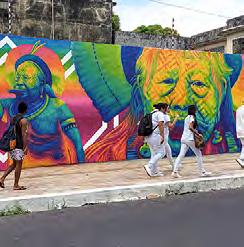
Coda (Data Journalism Conference) held for the 1st time in the North region (Federal University of Pará) mobilizes the data journalism ecosystem and gives prominence to Amazonian voices.
Data Ecosystem
VCA Brazil holds Round Talk on Climate Justice at the X Pan-Amazon Social Forum
VCA Brazil
Jandyras Network pushes for the creation of a Climate Forum in Belém and starts to have direct and indirect influence among the decision makers in the capital of Pará in policies and actions involving climate change.
Jandyras Network
feB aPr MAY jun jul
14 voices magazine #1

seP nov
VCA Global Alliance Partners get together in Cape Town, South Africa.
VCA
Voices of communities from all 9 states of the Legal Amazon mobilize for the climate policy agenda from Technopolitical Training with Focus on Climate Resilience.
Data Ecosystem
Trainings in Altamira, Imperatriz and Manaus encourage women to awaken to the socio-climatic urgency in their communities.
Climate Change Spawning Coalition

Workshop "The Post-elections in Brazil & VCA: what do we need to adjust in our Advocacy strategy?"
VCA Brazil Advocacy Committee
Activism videos produced by youth from the Tapajós region, with support from VCA Program. win awards and gain prominence in national and international climate events in 2022
Voices of Tapajós
Voices of Indigenous Peoples of the Amazon are strengthened through participation at COP27
Advocacy dos Povos Indígenas

COIAB & VCA Invite: Post-COP 27
Round Talk: Lessons Learned and Opportunities.
VCA and Indigenous Peoples Advocacy Coalition
The Popular Observatory of Sociobiodiversity and Climate Policy of Maranhão is created by the coalition
Agroecology for the Protection of Amazonian Forests.
Agroecology for protection of Amazonic Forests
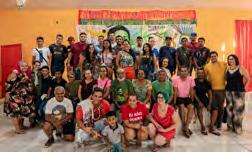
33rd Chico Mendes Week celebrates the patron of the environment with meetings, learning, artivism and youth involvement, in Acre.
Comunic(A)ctive Youwth Network
Elaboration of the Community Consultation Protocol for the quilombola territory of Santa Rosa dos Pretos and Santa Maria dos Pinheiros -Itapecuru-Mirim / MA.
Agroecology for protection of Amazonic Forests

Voices of Tocantins Coalition is admitted as Amicus Curiae in the Direct Action of Unconstitutionality (ADI) proposed by the Tocantins State Public Ministry against the State Environmental Licensing Law.
Voices of Tocantins
voices magazine #1 15
deC

VCA Advocacy
Commission: the weaving of the climate justice network
BOLÍVIA
The Advocacy Committee of the Voices for Just Climate Action (VCA) Program in Brazil has been bringing together representatives of VCA organizations since August 2022 to consolidate a network for climate justice. During this period, it was defined that the Commission’s role is to strengthen and support the advocacy strategies of VCA coalitions and organizations, with capacity building in advocacy and assistance in the design of strategies or action plans. The Commission also intends to monitor and help the different advocacy strategies of VCA partners in Brazil, seeking to consolidate a common vision of the network.
The Commission aims to: Promote exchanges of information and exchanges between coalitions and organizations.
• Provide spaces for articulation between organizations, such as preparation for the COP.
• Democratize knowledge and information on advocacy, climate solutions, environmental and climate public policies, climate governance and so forth.
Share connections, in the promotion of strengthening relationships with decision-makers.
Your tasks are:
• Systematize a common agenda among members of the VCA program: organize events and strategic meetings to build a unified Advocacy agenda and strategy (national and international).
• Disseminate the advocacy agendas of all coalitions, ensuring that all VCA actors in Brazil are aware of and engage in partner organizations’ advocacy activities and strategies.
Facilitate access to strategic actors who can contribute to the implementation of coalition actions.
• Systematize useful information for coalitions on advocacy issues.
• Map strategic events where VCA has the potential to impact.
Contribute to training activities on advocacy.
• Subsidize advocacy efforts.
• Support/suggest/answer questions about advocacy brought by partners.
Connect different advocacy strategies from various VCA partners.
• Be aware of unforeseen advocacy opportunities from VCA partners.
• Create spaces for experience exchanges between organizations.
The Commission wishes to ensure broad representation and invites all coalitions to participate in this space, to strengthen the role of VCA organizations in advocacy for Climate Justice; make VCA advocacy strategies visible, based on local voices; and connect advocacy actions, forging a network for climate justice, linking local-local actions, municipal, state, national and local to global actions.
For more information, contact your organization’s focal point in the Regional Team or e-mail: vacbrasil@avina.net
16 voices magazine #1
intense rains in a short period of time led the capital of Acre, Rio Branco, to a major flood at the end of March, killing thousands of families on the outskirts. These families, who already live in vulnerable conditions, were materially and emotionally affected by these losses. Now, they suffer from diseases such as leptospirosis, which spread due to the lack of basic sanitation in the flooded areas.
The rain caused the levels of dams, streams, and the main river in the state to overflow. The state became isolated, as the only road that connects Acre to the rest of Brazil had its structure compromised by the rains, as well as access to the airport, which is far from the capital.
Acre and other states in the Amazon suffer from the
Although the annual flows of inundations and droughts usually cause flooding, the records of rainfall series showed that the 2023 flood was one of the largest in the history of the state, which had numerous municipalities registering a state of calamity.
Science has already shown that with the increase in deforestation, extreme weather events, such as the rains that devastated Acre now (but which recently also claimed victims in São SebastiãoSP, Manaus-AM and in several cities in Maranhão state) will be increasingly more frequent. The IPCC summary report, released on 20th March, already
pointed out that mitigation policies - which aim to reduce greenhouse gas emissions - and adaptation - which structurally prepare cities, states, and nations to manage the consequences of climate change - have not been developed sufficiently.
What the scenes of the last few days show us is that these extreme events unequally affect Black women, people from the periphery, Indigenous peoples, and traditional communities. Climate injustice once again reveals the size of the social inequality we are experiencing. V
voices magazine #1 17 opiniON
By Angélica Mendes, WWFBrazil, and the VCA Program
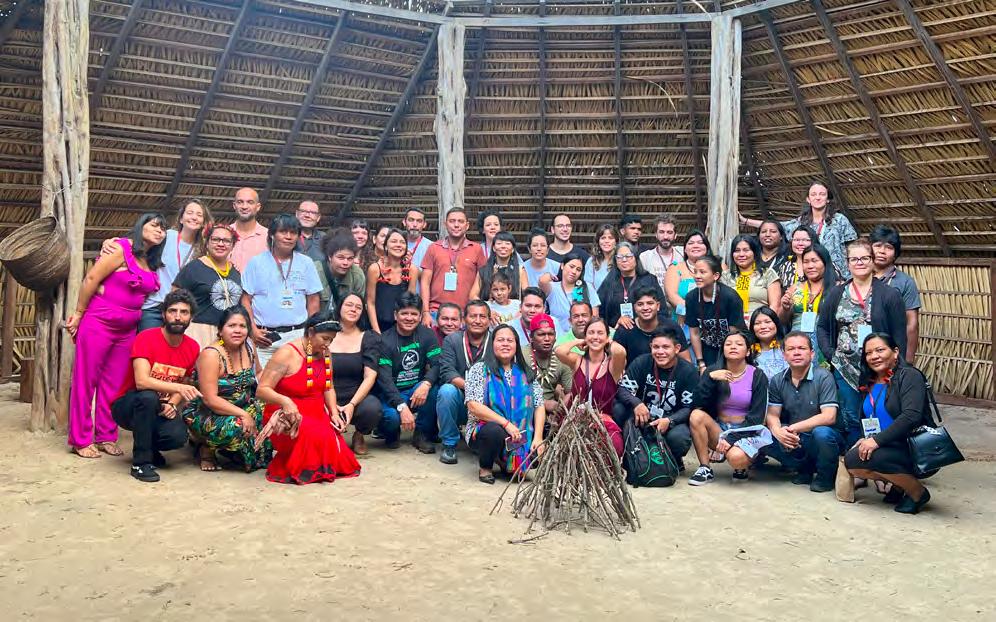
AUTHORITIES CLIMATE
Indigenous climate authorities discuss Climate and REDD+ for groups that keep forests preserved, in a meeting held by COIAB and IPAM.
With the advancement of discussions on climate change, the forms of remuneration for those who already maintain the preservation of the forest are also on the agenda. In Brazil, Indigenous peoples occupy 13.8% of the national territory and 22.6% of the Amazon region. On average, Indigenous Territories have the lowest deforestation rates in the country, directly affecting the fight against the effects of climate change.
Based on this, the Coordination of Indigenous Organizations of the Brazilian Amazon (COIAB) in partnership with the Amazon Environmental Research Institute (IPAM), with support from the Environmental Defense Fund (EDF), Voices for Just Climate Action (VAC), and The Nature Conservancy (TNC), promoted the Meeting on Climate and REDD+ Mechanism for Indigenous Peoples of the Amazon, from 24th to 27th January, in Manaus - AM.
18 voices magazine #1
By Advocacy Coalition of Indigenous Peoples for Climate Justice • Photos: Rede de Jovens Comunicadores Indígenas da COIAB
Participants of the Meeting on Climate and REDD+ Mechanisms for Indigenous Peoples of the Amazon, in Manaus
The event brought together representatives of 27 Amazonian peoples, including Indigenous climate authorities and members of COIAB’s Indigenous Lawyers and Young Communicators Networks. During the meeting, those present were able to build, improve and multiply knowledge about climate change and the REDD+ mechanism.
Among the climate authorities, the general coordinator of COIAB - Toya Manchineri, the head of the Environment Department at CIR - Sineia do Vale, the leadership of the Arara people - Francisca Arara, the technical advisor of the Global Alliance and member of the Indigenous Caucus on Climate Change at the United Nations Framework Convention on Climate Change (UNFCCC) - Juan Carlos Jintiach, and EDF Director of Tropical Forest Policy - Steve Schwartzman, participated in the event.

This meeting is part of a process of continuing education for indigenous representatives, aiming to contribute to their projection, political advocacy, technical knowledge, and effective participation in the climate change agenda, based on the dialogue of the Advocacy project of Indigenous peoples for climate justice of the coalition Voices for Just Climate Action. Offering ongoing training for leaders is something that Coiab has been seeking, with the reactivation of the Amazon Center for Indigenous Training (CAFI), to conduct courses and targeted training.
Timeline
At the meeting, a timeline was built on discussions about climate, environment, and sustainable development. The Kyoto COP, in 1997, initiated
some discussions by proposing that countries present targets for reducing gas emissions, which is known today as the Kyoto Protocol. The REDD development process began with a discussion between Brazilian and US researchers, in a proposal presented at COP-9, in 2003, entitled “Compensated reduction of emissions”, and this concept became the basis of REDD in the following years.
In 2007, at COP-13, in Bali, the decision known as Map of the Way of Bali was signed, which resulted in the concept of REDD+, which goes beyond deforestation, including the conservation of forests and sustainable management. Thus, the climate summit recognizes that the people who live in the forests are indispensable for keeping the forest standing.
The participation of Indigenous peoples and other traditional communities in discussions on
voices magazine #1 19 Network Actions
National and International Indigenous Climate Authorities debate REDD+ Mechanisms for Originary Peoples in the Amazon
climate change was highlighted at the event. Fernanda Bortolotto, researcher and one of the event’s mediators, emphasizes the presence of COIAB and the National Council of Extraction Populations (CNS) in the COPs, already in the early 2000s, focusing on debates on climate, sustainable development, and reduction of emissions.
Thus, Coiab’s general coordinator, Toya Manchineri, emphasized the importance of participating in discussion instances and seeking to increasingly guide the Conferences between the Parties.
“One of the points we can think about is our participation in the COPs. Reach out to government officials and say that if there is no global change in the way of life on the planet, we will not be able to sustain these changes. We must use our Indigenous knowledge and call on governments and scientists to have a deeper debate, think about a joint action”, she points out.
n the letter that resulted from the meeting, we highlighted two recommendations - among the 13 proposals in the document.
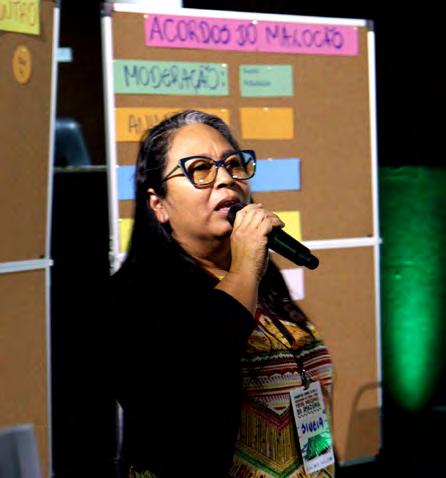 Sineia do Vale, Head of Environment Department of the Indigenous Council of Roraima (CIR).
Sineia do Vale, Head of Environment Department of the Indigenous Council of Roraima (CIR).
Ensure the full and effective participation of Indigenous peoples in the design, implementation, monitoring and evaluation of jurisdictional REDD+ programs respecting the parameters for prior consultation established by ILO Convention No. 169, the 2007 UN Declaration on Indigenous Rights, and the 2016 OAS Declaration of Indigenous Rights and other relevant legislation.
Guarantee the accreditation of Indigenous representatives linked to their representative organizations to the negotiating tables of the Climate Conference (COP) by the responsible body in the Brazilian government.
Experiences
In the program, there was space for discussing REDD+ paths and sharing experiences, both positive and negative. One of the positive experiences brought to the meeting was that of the Paiter Suruí people, who implemented the Suruí Carbon Project after 7 years of collective construction on carbon trading, in which they were initially able to sell to Natura and FIFA. Gasodá Suruí highlighted the need for initiatives that value Indigenous climate authorities.
“How we take care of the forest contributes to the good of humanity. That is why we think we must be recognized as guardians of the forest. The good we do for the forest deserves a reward. So it was in that sense that we took this project - so that we could be rewarded for the care we take of the forest, and we called various partners to build this project together with us”, pointed out Gasodá.
On the other hand, while the Paiter Suruí were able to collectively compile the proposals, the vice-coordinator of the Federation of Indigenous Peoples of Pará (Fepipa), Alessandra Munduruku, censured the presence of companies pressuring leaders to sign carbon credit contracts, disrespecting the Protocol of Munduruku Consultation.
Indigenous leaders from the Alto and Médio Tapajós and Baixo Teles Pires regions presented
20 voices magazine #1

a letter, listing all the situations of threats to life and the territory they have faced, such as contamination by mercury due to illegal mining, now added to the enticement of communities to sign carbon trading contracts. The letter can be read here.
REDD stands for Reducing Emissions from Deforestation and Forest Degradation. It is a mechanism that remunerates those who keep the forests standing, and with that, avoids greenhouse gas emissions associated with deforestation and forest degradation. REDD+ includes conservation and sustainable forest management activities.
COP is the acronym for Conference of the Parties, considered the largest and most important climate summit of the United Nations (UN), being the forum for discussion and decision on climate change. The COP receives leaders and representatives from more than 190 countries and takes place annually. Each year, countries sign agreements and/or outline guidelines for already signed commitments. V
Advocacy of Indigenous Peoples for Climate Justice
The Advocacy Coalition of Indigenous Peoples for Climate Justice is led by the Coordination of Indigenous Organizations of the Brazilian Amazon (COIAB) and consists of 9 other Indigenous organizations and the Institute of Amazonian Research (IPAM).
The purpose of the alliance within the Voices for Just Climate Action Program is to raise the voice of Indigenous Peoples, claim the space for Indigenous peoples to speak, both outside and within Brazil, to produce and strengthen actions in defense of Indigenous territories, an ecologically balanced environment for all (globally speaking), ensuring access to the benefits historically and culturally provided by the environmental protection of Indigenous Peoples and by participating in support systems in the carbon market as a result of their contribution to the reduction of greenhouse gases.
Crisanto Xavante.
voices magazine #1 21 Network Actions
COIAB’S LETTER
Final document of the meeting on climate and mechanism of REDD+ for indigenous peoples of the Amazon
we, the Indigenous peoples of the Brazilian Amazon, represented by leaders of the COIAB Network, the Young Indigenous Communicators Network and the Indigenous Lawyers Network, in addition to the partner organizations, gathered at the Peoples of the Amazon Cultural Center, in Manaus/AM, from January 24 to 27, 2023 to participate in the “Meeting on Climate and REDD+ Mechanism for the Peoples of the Amazon” to learn, improve and multiply basic knowledge about climate change and the mechanisms to address this issue, in particular, the mechanism known as REDD+. Based on this positioning, the main objective of this meeting was to build an indigenous strategy for lifelong education to influence the climate debate in the Amazonian estates, in national and international scopes.
We know that the Amazon is considered an important regulator of temperature in the region - a natural “air conditioning” - and a giant carbon store that guarantees the distribution of rain for a good part of Brazil and South America. These environmental services, however, are being threatened by climate change, whose roots are also in deforestation and forest degradation, issues with direct consequences for our well-being and the entire planet.
The Indigenous Lands of the Brazilian Amazon are the focal point of global attention due to their climatic and socioenvironmental importance. We, Indigenous peoples, live in an important area that covers approximately 23% of the Amazon region, or about 115 million hectares. In our territories we conserve vast forests, ploughed fields, savanna, and other types of vegetation and, therefore, we are internationally recognized as fundamental to maintaining a good part of biodiversity and the global climate balance. Likewise, we believe that other forest peoples and Indigenous peoples from other biomes in Brazil are essential for maintaining climate harmony.
22 voices magazine #1
Thus, we must know and publicize the trajectory of the indigenous movement in this process of protecting the climate future in the region and the world. With the perception that we are authorities on the climate, we hope to connect the various sciencesIndigenous and non-Indigenous - in the processes of mitigation and addressing climate change. This has been important for the more categorical introduction of Indigenous peoples in spaces for debate and decision-making on the subject. These action fronts are fundamental, as reducing deforestation is not enough anymore to reverse the impacts of climate change on our lives.
In this context, comprehending that Indigenous peoples have proven to have contributed to maintaining the climate balance of the planet through our ancestral and respectful relationship with the earth, we present to the government bodies of the Brazilian State the following recommendations on climate change, within the core of policies and mechanisms that involve the theme:
1 Develop a lifelong education program that includes national and international policies on climate change and REDD+ which interacts with indigenous realities in their territories and the urban context, under the principles of climate justice.
2 Provide guidelines and mechanisms for the implementation of the Cancun safeguards in the process of elaboration of individual carbon projects to avoid endangerment of the sovereignty, autonomy and well-being of Indigenous peoples in their territories, in light of the parameters for prior consultation established by ILO Convention No. 169, the 2007 UN Declaration on Indigenous Rights, and the 2016 Declaration on OAS indigenous rights and other pertinent legislation, as well as to balance the relationship between companies and indigenous communities;
voices magazine #1 23 opiniON
3
4
To guarantee the participation of Indigenous peoples in all spaces of governance, at municipal, state, national and international levels.
Ensure the full and effective participation of Indigenous peoples in the design, implementation, monitoring and evaluation of jurisdictional REDD+ programs according to the parameters of prior consultation established by Convention No. 169 of the ILO, the 2007 UN Declaration on Indigenous Rights, and the 2016 OAS Declaration of Indigenous Rights and other relevant legislation.
5
9
6
7
To ascertain the accreditation of indigenous representatives linked to their representative organizations to the tables of negotiations of the Climate Conference (COP) by the responsible body in the Brazilian government.
To guarantee resources to facilitate the participation, training, and impact of Indigenous peoples on the subject.
To conduct information campaigns in coherent language aimed at Indigenous communities, including interpretation into Indigenous languages.
8 Support the implementation of Environmental and Territorial Management Plans (Life Plans) that have already been created and promote the creation of new management plans in areas that do not yet have one.
10 11 12 13
To respect the consultation protocols of Indigenous peoples and encourage the development of consultation protocols in territories that do not possess them yet.
To reactivate the Technical Chamber on Climate Change of the Steering Committee of the National Policy for Territorial and Environmental Management of Indigenous Lands (PNGATI).
To create a legal committee composed of Indigenous and Indigenist lawyers, FUNAI’s Specialized Federal Prosecutor’s Office (PFE/ FUNAI), CONJUR, MPI, Federal Attorney’s Office (AGU), Ministry of the Environment (MMA), Federal Public Defender’s Office (DPU), Federal Public Prosecutor’s Office (MPF) for analysis, follow-up and guidance on contracts for individual carbon projects in Indigenous Lands.
To reactivate the National Commission for REDD+ (CONAREDD+) and secure the seat and effective occupation of delegates concerning organizations that represent the indigenous movement.
To map REDD+ projects and initiatives in the Brazilian Amazon.
24 voices magazine #1
COMmunication & CLIMATE JUSTICE
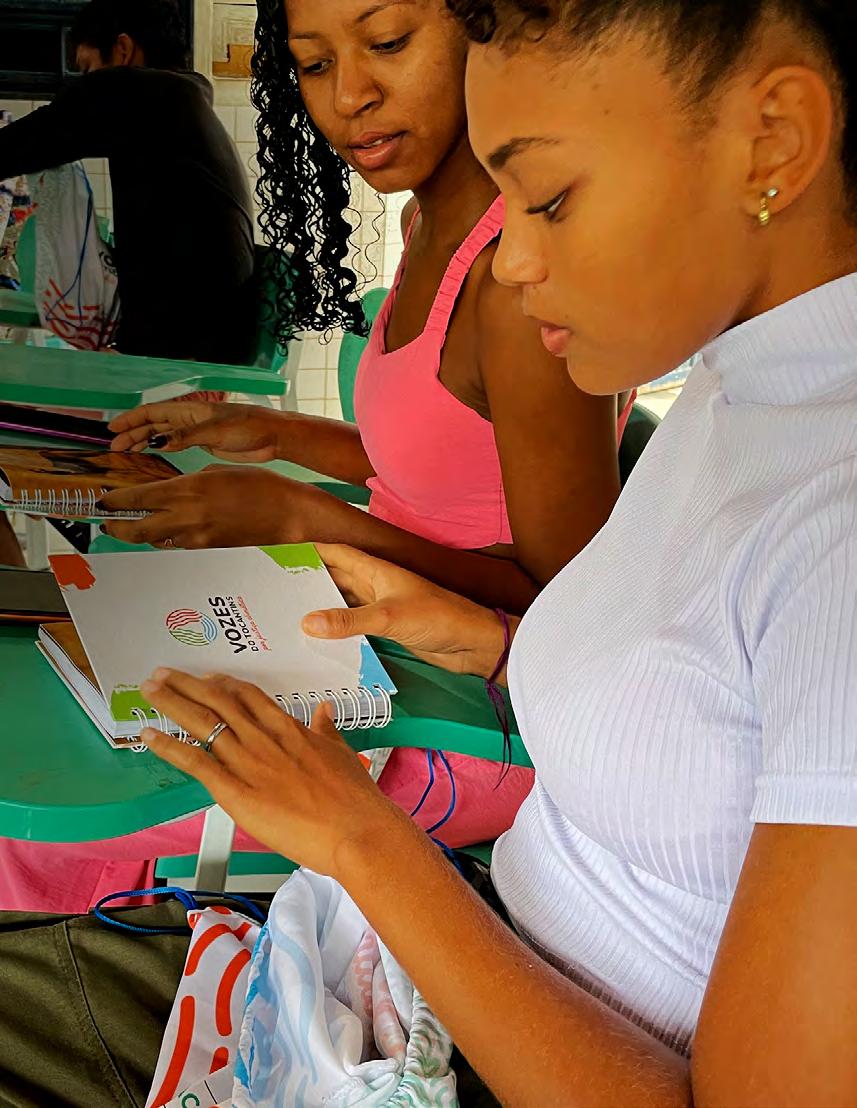
Intercultural training in climate justice for young quilombolas, indigenous people, fishermen and family farmers in Tocantins.
By Silvana Bastos, from ISPN and Voices of Tocantins Coalition
the climate crisis in Brazil is framed by inequalities, violation of rights, violence in the countryside and social injustices that distance and delay the process of maturation and consolidation of democracy and the materialization of the rights provided for in our Constitution. One of the elements of this picture is the lack of representative voices of traditional peoples and communities in the spaces of negotiation, construction of agreements and visibility of the Climate Agenda, whether at the international level, at the United Nations Conferences on Climate Change (COPs on Climate Change), whether at the national level, in the areas of construction and implementation of the National Policy on Climate Change.
The Voices of Tocantins Coalition for Climate Justice articulates ten organizations1 to expand and qualify the performance and visibility of quilombolas, Indigenous people, small scale fishermen, settlers and tent dwellers of agrarian reform and those involved in agroextraction activities in the defence of their rights. Faced with the challenge of conquering rights and promoting justice in the Climate Agenda, it
voices magazine #1 25 Network Actions
also supports the fight for public policies engaged with the insertion of young people and community organizations from Tocantins in the global debate on climate justice and the Amazon Climate Agenda, through continuing training for young people, strengthening communitybased organizations and an integrated communication & advocacy strategy.
In terms of training young people, the coalition has been implementing the pedagogical plan for the Modular Course in Climate Justice and Communication. The course started in March 2023 and ends in July, comprising four face-to-face modules, involving 31 young people nominated and accompanied by the coalition organizations. The group is made up of young people aged between 16 and 35, representatives of the Krahô and Apinajé indigenous peoples, quilombolas from three territories in different regions of the state, fisherwomen from the Araguacema Fishing Colony, settlers and tent dwellers linked to the Landless Rural Workers Movement (MST), babassu coconut breakers, as well as those involved in agroextraction activities from the Cantão/Araguaía region. The four in person modules are conducted in immersion in four communities, namely: IL Krahô/Pedra Branca Village; IL Apinajé/Prata Village; Kalunga do Mimoso Quilombola Territory; and Olga Benário Agrarian Reform Camp.

territories and family production for environmental conservation, food and nutrition security and sovereignty associated with Bem-Viver2 in Brazil, as opposed to the heightened economic model in the State of Tocantins in recent years, founded on the advance of agribusiness, land grabbing with the expulsion of communities from their territories, deforestation and social exclusion.
The objective of this intercultural education process is to contribute to the formation of agents of change through the development of competencies (knowledge, skills and attitudes) to address the issues of youth invisibility and the insufficiency of voices of people and traditional communities of the Tocantins in the debate on climate justice and in the struggle for recognition of traditional
For this purpose, the training approach is based on the principles and practices of popular education. Such orientation implies that the themes must emerge from reality and its meaning for the participants and promote the enchantment necessary to mobilize action aimed at the common good. Broadening this conception is an important task in the building of the pedagogical plan, allowing participants to recognize and organize the learning that comes from their discoveries and practical experiences. This premise is the basis of the popular education learning process translated into course planning from the generating themes, identified with the communities and agreed upon within the scope of the Coalition’s management council.
26 voices magazine #1
Youth from Voices of Tocantins Coalition. during the Modular Course on Communication and Climate Justice, in Pedra Branca Village, Krahô Krahô Indigenous Land, TO.
Foto: Sara Tamioso/Kiw Assessoria
This “learning from practice” approach was implemented by the Institute of Social Development and the Society, Population and Nature Institute – ISPN in 2018, in Western Bahia, and inspires this initiative in Tocantins. This approach includes four stages in the design of learning situations and intercultural relationships that training will provide:
To reveal and characterize reality: characterization is, above all, an awareness. It allows participants to highlight and structure their perception of reality (community, organizations, context, themselves) while creating the opportunity to broaden this view from the exchange with other participants. In the characterization, the participant has the chance to become aware of aspects of which he was previously not aware.
To expand references: If, on the one hand, characterization can raise new questions about reality, in the oxygenation stage what is sought is to bring references that serve as a term of comparison and reflection on reality (including oneself), but also be able to indicate instruments and techniques that enable new ways of coping with certain situations. Oxygenation is the link between characterization and taking the initiative (to conduct), providing feedback to characterization, and guiding the execution of an action, initiative, or experimentation.
Experimentation: allows the participant to put into practice an acquired skill or knowledge, and therefore identify doubts, and limits (including personal ones) and confirm potentials and challenges of integration with their reality. Although the focus of the action is to create a basis for learning.
To reflect and learn: while reflecting, the facilitator has a fundamental role, to lead participants to identify, organize and value the lessons learned from practice. For this reason, learning situations must be created that lead the person to deepen their reflection, manage resistance and draw conclusions.
These four stages are essential processes and underlie the creation of the four in-person modules and three distance modules (community time) of training in climate justice with young people linked to the Voices of Tocantins Coalition for Climate Justice. In this way, the contents will be defined with strong participation from the class, guided by the generating themes:
1. conservation of the Cerrado (Savanna);
2. rights of traditional peoples and communities;
3. social communication;
4. climate change and youth engagement for climate justice.
These themes will be intertwined by three common threads: a) social skills to lead/be an agent of change; b) key concepts, information, and tools in the negotiation spaces of the Agenda for Climate Justice; and c) change experiments – action plans designed, implemented, and managed by the participants.
It is expected that training in climate justice will contribute to the sustainability and strengthening of networking and intercultural articulations in the state, together with increasing the visibility of the claims and solutions promoted by family farmers, peoples and traditional communities within the scope of the Amazon Climate Agenda, especially with the expansion of Tocantins’ youth voices in the negotiation spaces of global and national agreements, such as the United Nations Conference on Climate Change. V
voices magazine #1 27 Network Actions
data for
How the open data ecosystem can transform the narrative about the Amazon
in 2022, the largest data and innovation event in Latin America, the Brazilian Conference on Data Journalism and Digital Methods (Coda.Br) had its first regional edition in seven years of history. Coda Amazônia carried out in coalition with different organizations through the Voices for Just Climate Action (VCA) program, brought together in Belém (PA) more than 150 participants to talk about civic innovation, open data, data journalism, public transparency, and methods fingerprints.

Also, last year, the mapping of data ecosystems and civic innovation in the Amazon identified 182 actors who dialogue with local issues. These movements can be fundamental to driving the transformation of popular participation narratives and technologies in the Amazon region. By establishing a community for exchanging and promoting information, it is possible to develop a local culture that values the role of residents in the region as protagonists in building solutions for relevant issues in the community.
Through the Escola de Dados (School of Data) program, Open Knowledge Brazil accessed
CODA panels and workshops brought together over 150 people discussing and working with data during the conference.
this territory for the first time. But since the construction of the idea of holding a local edition of Coda, promoting the protagonism of local actors has been a priority. Half of the people invited to the first Coda Amazônia are from or residents of the North region. The same principle was also applied to contracting suppliers of services and materials for the event.
“We started the conference program talking about colonialism and data extractivism, about corporate
28 voices magazine #1
By Jamile Santana, from the Coalition Strengthening the Data Ecosystem and Civic Innovation in the Brazilian Amazon.

actors appropriating data, but how do we, different parts of this ecosystem, manage to collect or produce data to drive our narratives, tell what is happening, from our perspectives? The coalition of organizations that promoted this event, and the VCA project more broadly, seeks to strengthen the civic innovation ecosystem in the Amazon. It is how we unite our capabilities to strengthen local voices”, highlighted the executive director of Open Knowledge Brazil, Fernanda Campagnucci.
Coda Amazônia was a hybrid, with 13 in-person workshops and live transmission, via YouTube, of its three main panels. There were more than 800 views online (via YouTube), around 47.1 thousand impressions of messages on the Escola de Dados (School of Data) profile and more than 3.6 thousand page views on the event’s website. The audience came from 49 cities located in 21 Brazilian states, which shows that the North region became the center of discussion in other regions during the event.
“I was able to understand more about some new subjects, mainly knowing the names of people of reference, who I will follow up with”, a participant
replied when answering the anonymous form of evaluation of the event.
The event also provided connections, as in the case of a participant from Rio Branco, in Acre, who met a teacher from his city during Coda, in Belém. “For me, the theme was very relevant. I loved the participation of Sonaira [Silva], who I had never met in Acre, but we ended up connecting in Belém. As I am from Law, I believe that I would need to have a deeper contact with data analysis to be able to visualize tangible uses”, replied another participant.
For Jader Gama, information technology advisor at Funbosque, a researcher at the Center for High Amazon Studies at UFPA and a member of the Casa Preta collective, the face-to-face edition contributes to organizing local articulation.
“Having participated in the first historic edition of Coda Amazônia shows that our group, consisting of very different people but with common goals, is on the right track. We can contribute and articulate an ecosystem. We are networkers, and this has a very large symbology in the Amazon territory”.
voices magazine #1 29 Network Actions
CODA panels and workshops brought together over 150 people discussing and working with data during the conference
Foto: Divulgação/OKB
Mobilization and impact
The event was organized by Escola de Dados (School of Data), from Open Knowledge Brazil (OKBR), through the coalition Strengthening the Data Ecosystem and Civic Innovation in the Brazilian Amazon, which involves institutions based in Pará – Casa Preta Afro-Engagement Association and Digital Inclusion of the Amazon Friends Association (INDIA/Puraqué Collective) – and from other regions (PyLadies Manaus and InfoAmazonia) under the Voices for Just Climate Action (VCA) program.
Beyond the involvement of the local organizations involved in the coalition, this participation and articulation initiated the dialogue with the Panamazonic Social Forum network, having as an initial step the choice to undertake Coda Amazônia as one of its preparatory activities. Then, the Federal University of Pará – through the Faculty of Communication (FACOM) and the Graduate Program in Communication (PPGCOM) – also joined efforts and provided their facilities to carry out the activities, as well as connecting Coda Amazônia to local students and researchers who formed the event’s documentation team.
49 cities FROM 21 Brazilian states
3 discussion panels
13
Proof that the initiative began to take root was the creation of the Working Group composed of academics, public managers, and civil society organizations to coordinate the 2023 edition of the event. V
33,5 hours of activities hands-on workshops
30 voices magazine #1
+ 800 Online participants
Federal University of Pará Belém • Pará AmazON• BraZil
FIRST CODA AMAZÔNIA 27th and 28th of July | 2022
Art IN
BATTLE
The unavoidable future of oil is underground, the unavoidable future of the forest is standing upright
Text excerpt originally published in the free research on art activism, environment and climate collapse, in November 2021
By Jonaya de Castro, from the Megaphone Coalition
We are rapidly moving towards global warming of 1.5 °C above normal temperature (without human intervention). This limit is the maximum we can reach, according to scientists and scholars, to avoid the worst disasters and impacts on life on Earth and the extinction of several species, including the survival of the human species.
According to studies by the IPCC (Intergovernmental Panel on Climate Change) we are already in a scenario of climate collapse. We will face irreversible environmental disasters if we do not slow down the consumption of fossil fuels and the deforestation of the planet’s forests, among several other human actions.
CULTURAL MODEL TRANSITION
A new draft of the final agreement of the 2021 Climate Summit (COP-26), held in November 2021 in Glasgow, maintained the basic demand for countries to define plans to face global warming. The proposal maintained the call for countries to accelerate “efforts toward the progressive elimination of coal-fired power and inefficient fossil

Ashes, remains of trees and charred animals were the raw material for the paint used by the artist Mundano to paint the panel in the center of the city of São Paulo, called “O Brigadista da Floresta (The Forest Brigade)”, 2021. The work sheds light on the destruction of the great Brazilian biomes, which are literally being reduced to ashes. The “Forest Brigade” is a reinterpretation of a very representative work of Brazil painted by Portinari: “O Lavrador de Café (The
fuel subsidies”, but, in a new amendment, now points out that nations will recognize “the need to support a just transition”, a reference to requests for financial assistance from developing countries.
AThe idea of a “just transition” emerged in the United States in the 1970s, during the strike that was called the first environmental strike by the Oil, Chemical and Atomic Workers Union (OCAW) on health and safety issues at Shell refineries.
voices magazine #1 31 opiniON
Coffee Grower)”, 1934.
@mundano_sp
We will talk more about Shell throughout the text.
The “just transition” is a cultural pact. A new model of society needs to emerge, in all areas. Public and private initiatives and organized civil society, working towards changes that avoid climate breakdown. And it is in this place that culture plays a fundamental role. Culture is the platform where theories, paths and narratives are built in the human imagination. Culture is the platform of the imaginary. To avoid the point of no return, the climate collapse, art activism can be one of the main tools for building the imagination of the transition.
COMMUNICATION AS WORK OF ART, THE ART ACTIVISM
@denilsonbaniwa

Art activism, as an artistic action, is part of the contemporary scene that, in addition to recording history, intends to provoke political and social engagement. Activist art finds space in artists, collectives, and movements. Art activism makes use of artistic, aesthetic, or symbolic strategies to amplify, sensitize and problematize society, causes and social demands.
Acting collectively means acting in the field of cross-cutting, producing forms of subjectivity, and working with cooperation and inter-activism. Art activism operates in any space, but the city, the urban space, a place for social interaction in both dimensions, is the main stage for actions and interventions.
Communication as a work of art, or art seen as a means of communication that occupies a radical media space, causes a great impact on aesthetic and interactive content.
The actions of an art activist are not only linked to rhetoric, engaged discourse, the artist’s aesthetics, or ethics, but his involvement in social issues that can, through his practices, produce real changes.
DEAD NATURE. Denilson Baniwa is a Brazilian art activist who inspires the search for a decolonizing culture. From the Baniwa people, he uses Western languages and creates new contexts to decolonize them in his work. The artist in his contemporary trajectory consolidates himself as a reference, breaking paradigms, and opening paths for the protagonism of Indigenous peoples.
“Art activism is a communication strategy to reach the public, deviating from the hegemonic means that conduct the narratives. It is one of the most rebellious means of communication that we still have left”.1
Although the art scene used the concept of “art activism” just a few years ago, art activists have been around forever. Therefore, it is worth remembering and registering inspiring works that will continue to guide us in the construction of a possible imagination of the existence of life on the planet. V
“To access the complete “Art in Battle” research click here. For more info: falecomjonaya@gmail.com
32 voices magazine #1
‘RAONIZING’ THE CITIES
mood
To change the current course of climate collapse that we are experiencing, it is necessary to create a new model of society, with a new concept of development. But how do we conquer and engage hearts and minds, while condemning the disaster and those accountable for it and suggesting new paths forward? With Art Mood we record history, amplify the noise, and raise political and social awareness! Get in the mood with us!
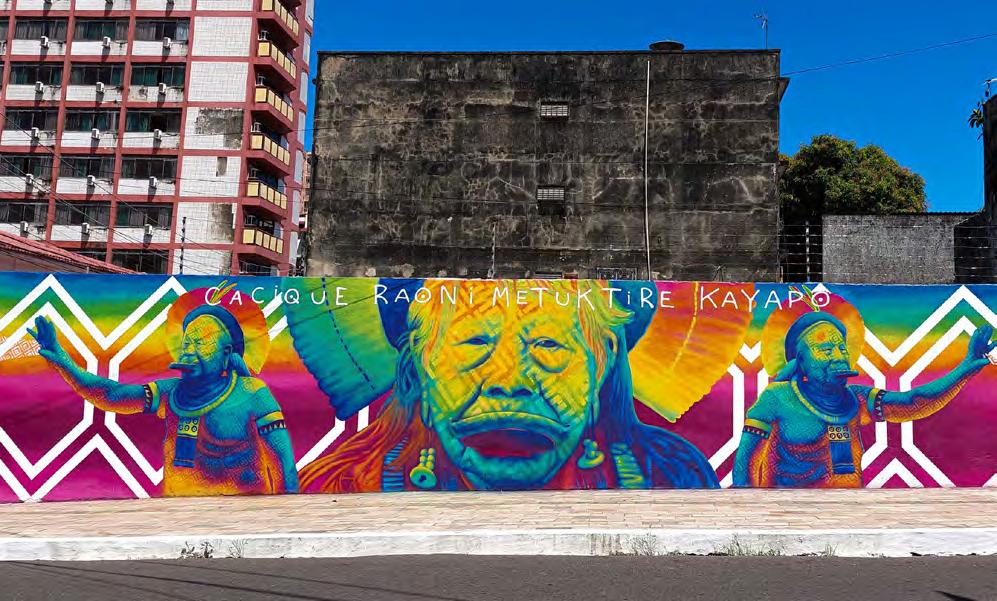
A mural was created in the heart of Manaus, as part of the “Raonizing the Cities” action, in tribute to Chief Raoni Metuktire, who has been dedicating his life to defending the Amazon and its original peoples.
The mural was painted by the artist and muralist @raiz.campos, during the 2022 International Environment Week, conducted by Megaphone Activism.
MERCURY CONTAMINATION OF TAPAJÓS
The action of the artivists @roledaflor and @norahcosta carried out in Santarém-PA, in May 2022, denounced mercury contamination of rivers, fish and people in the Tapajós basin and ensured visibility to the Public Hearing which discussed the impacts of contamination and the creation of the Forum to Combat Mercury Contamination. In the action, young people demanded mass testing of the population and a policy that prevents poisoning from continuing.

voices magazine #1 33
Photo by Jander Manauara
Photo by Escola de Ativismo
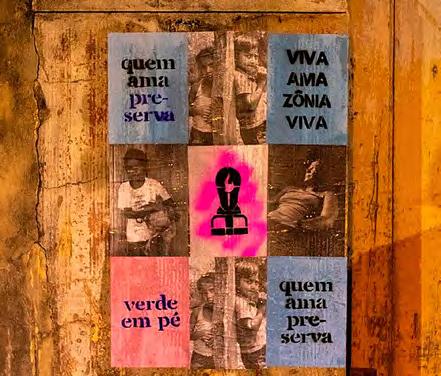
WHO LOVES SPREADS ART
A cultural invasion took place in Xapuri-AC, during the 33rd Chico Mendes Week, in December 2022. With posters in hand and artivists present, the city was filled with messages in the form of art to remember the importance of the Amazon and its people.
In September 2022, the “15 seconds information” campaign featured projections and collages of posters in seven different cities in the country: Manaus, Belém, São Paulo, Fernando de Noronha, Recife, and Brasília. Each working group located in the participating cities was responsible for suggesting agendas related to problems in their state, and one of the campaign’s objectives was to bring climate change as an urgent matter for the election. The actions were conducted through the mini-supports program of the Megaphone Activism Coalition.

POETRY
Human life is to take care
When you breathe fresh air
Though in the dark entrapped
In the woods ensnared
Near the animals
That in nature travels
I speak so definite that we are alike
For there´s human life Beasts and plants alike.”
Anacleto Maciel, resident of the Chico Mendes Extractive Reserve – Acre, recited by his son, Alexandre Maciel, known
34 voices magazine #1
Photo by Marcelo Dagnoni
as Xandão.
Photoby@15segundosinformativos 15 SECONDS INFORMATION LISTEN HERE
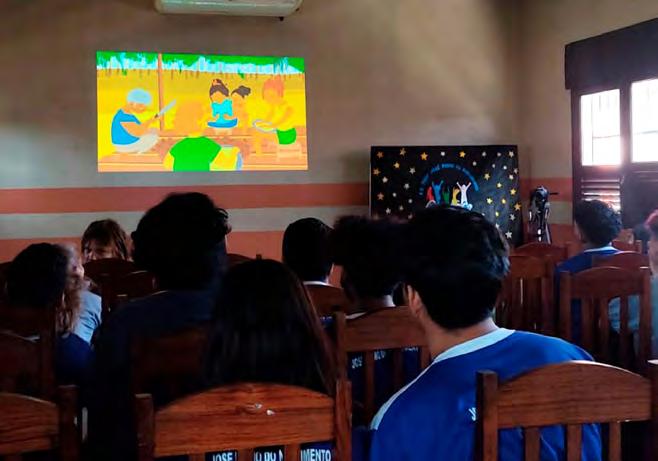
SURARAS DO TAPAJÓS
The Carimbó Group, “Suraras do Tapajós”, is the first musical group in Brazil composed only of Indigenous women. With concerts held in the North, Northeast, Southeast and Midwest, the group is a valuable tool to amplify the voice of this collective of women who use music as a form of resistance, making the existence of Indigenous peoples echo far beyond their territories. The Suraras are part of the Voices of Tapajós Coalition.
Listen to the sound of Suraras.
Spotify Youtube
ARAGUARI SEEDING WOMEN
The short animation from Amapá “Seeding women of Araguari”, by the production company Catraia Filmes, features a group of women involved in extraction activities from the Amapá National Forest and shows how it is possible to survive on the natural resources of the forest without destroying them. From the daily coexistence inside the forest, the Araguari seeding women show the power of change in their lives and the ancestral wisdom that comes from the forest. The short film was shown 10 times in different regions of Amapá, in public schools, quilombos1, communities and through the river film festival Cine Catraia. Seeding women of Araguari is part of the mini-supports program of the Megaphone Activism Coalition.
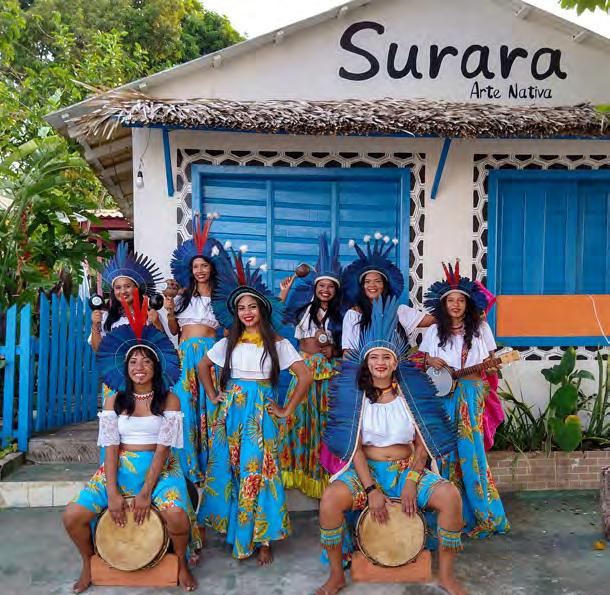
voices magazine #1 35
AROUND THE WORLD
It is not just in Brazil - In other corners of the world, the grassroots voices are also questing for climate justice. What is happening in the climate justice movement in other countries and on the global stage? How are these voices performing? What do they have to say?
GROUNDED RAISED foot voices
By VCA team
Reference activists from three countries tell their experiences and actions for climate justice
In November 2022, the Voices for Just Climate Action Program (VCA) launched a series of videos with three stories of characters who are reference in the fight for climate justice. These three voices from Brazil, Paraguay and Tunisia echoed in Sharm El-Sheikh, Egypt, during COP27 events. Come meet them too!
36 voices magazine #1

Zulma Franco
In the Paraguayan Pantanal, Zulma Franco is a teacher and leader in the Yshir Ybitoso ‘Virgen Santísima’ community in Fuerte Olimpo. In the video, she presents the threats to her territory by reinforcing how ecosystems, biodiversity, and the cultural wealth of Indigenous peoples´ protection is fundamental for just climate action. The VCA Program is also present in Bolivia and Paraguay, with different actions in the region of Chaco.
Access the full video

rogério mendes
Activist and extractivist. Son of Raimundão and nephew of Chico Mendes, Rogério Mendes shows a little of his day-to-day life as a Brazilnut picker, rubber tapper and how he uses social networks to show the importance of the standing forest based on his experiences at the Resex that bears the name of his uncle, in Xapuri, Acre.
Access the full video
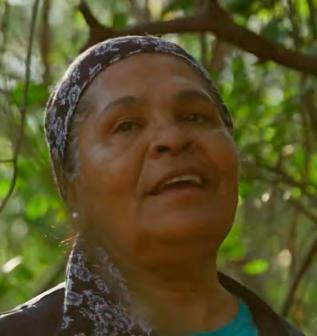
Zakaria Hechmi
In the oasis of Chenini, in Gabes, Tunisia, Zakaria Hechmi is a family farmer and seed producer. A climate activist, he uses his traditional knowledge and political articulation to fight for the right to water, land use and the importance of native seeds to guarantee the food sovereignty of his community.
Access the full video
voices magazine #1 37
at COP27 VOICES
27@27 Contest took 27 voices from the Global South to reinforce the need for accelerated and accessible climate finance.
By VCA Team
at COP27, the Conference of the Parties on Climate Change, voices from all seven countries of the Voices for Just Climate Action Program (VCA) joined forces to represent civil society in an event where business lobbies are increasingly present.
In addition to the representatives of organizations, movements and collectives at events, negotiations, articulations, and meetings, those who were unable to be there were able to convey their messages and share the impacts of climate change in their territories and the solutions they have been implementing to mitigate, adapt and tackle the effects of the climate emergency.
At a function where representatives of the Dutch Ministry of Foreign Affairs and the United States Agency for International Development – USAID, the VCA program showcased a video with 27 voices presenting their local realities and the difficulties in accessing climate finance.
The videos came from the 27@27 contest, where VCA partners and youth collectives had to produce one-minute videos. Brazil had seven
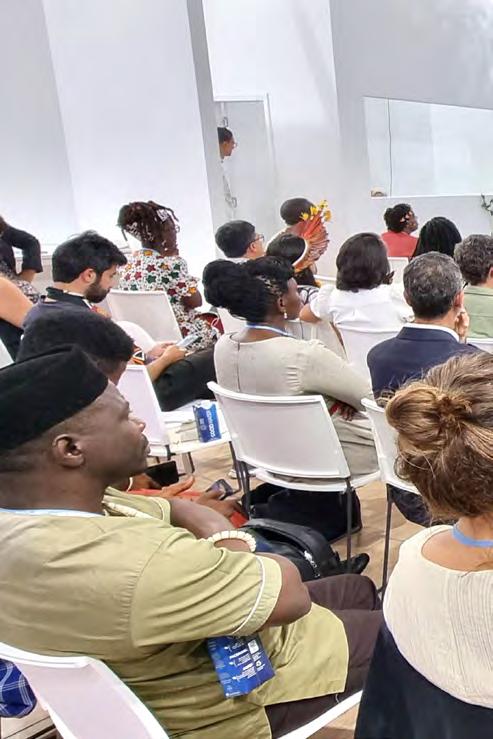
Global Witness Report pointed out that 636 fossil fuel lobbyists were accredited by the COP, 26% more than at COP 26 and more than the delegations of many countries in the Global South. COP 28, in Dubai, located in the United Arab Emirates, will be chaired by Sultan Ahmed al-Jaber, Minister and CEO of the state oil giant Abu Dhabi National Oil Company.
38 voices magazine #1

applicants and four were selected. The winners had their videos played at an event at COP27 and were awarded 500 euros each. The goal of the event aimed to create a space where voices from communities across the Global South are heard, emphasizing the power of a range of narratives in addressing climate change.
In front of an international audience that included representatives of funding agencies, the event sought to form connections and create an environment in which grassroots voices could stimulate debates on the urgency of mobilizing climate finance in an accessible way.
“We are tired of seeing development advertisements. We need to stop. We need to listen to local voices and their solutions. This is the truth”, reinforced Sheela Patel, activist and academic of Slum Dwellers International (SDI), an organization of the Global Alliance of the VCA Program. V
We are tired of seeing development advertisements. We need to stop. We need to listen to local voices and their solutions. This is the truth”
voices magazine #1 39 VOICES AROUND THE WORLD
Sheela Patel, activist and academic of Slum Dwellers International (SDI), an organization of the Global Alliance of the VCA Program
Watch the video with the 27 winners here.
UN 2023 CONFERENCE WATER
the imminent risk of water scarcity globally due to excessive consumption and climate change has alerted us to the need to establish robust international mechanisms to prevent the global water crisis from getting out of control. Through the Water Conference, which brought together at least 12 heads of state and government, around 80 ministers, senior government officials and more than 6,500 civil society representatives on World Water Day, the UN sought to achieve global commitments to change the management paradigm.
For the international body, reaching urgent measures through pacts based on collective dialogues was one of the priorities. The search for gold and the threat to the Amazon rainforest and its people were the themes of panels in New York as part of the Conference, which included the participation
Voices of Tapajós Coalition puts the struggle of the Munduruku for clean water in villages affected by mining amidst the global debate.
By Samela Bonfim, from the Coalition Vozes do Tapajós Combating Climate Change

40 voices magazine #1
“We have participated in debates inside and outside the Conference, such as the one held at Columbia University, where the documentary ‘The Amazon: A New Minamata?’, by award-winning Jorge Bodanzky, was also shown. It has been a good opportunity to talk about the contamination of rivers, illegal mining, mercury, the situation of Indigenous peoples, riverside dwellers, and solutions for access to quality water that we have undertaken together in Tapajós”
of the general coordinator of the Saúde e Alegria Project (PSA), Caetano Scannavino, and the Indigenous leader of the Munduruku people, Alessandra Korap.
“We have participated in debates inside and outside the Conference, such as the one held at Columbia University, where the documentary ‘The Amazon: A New Minamata?’, by award-winning Jorge Bodanzky, was also shown. It has been a good opportunity to talk about the contamination of rivers, illegal mining, mercury, the situation of Indigenous peoples, riverside dwellers, and

solutions for access to quality water that we have undertaken together in Tapajós”, highlighted Scannavino
The Indigenous leader Alessandra Korap has reinforced the accusations of contamination of the Tapajós waters by mining activities as a spokesperson for the Original Peoples. Indigenous activist of the Munduruku people, Alessandra was the first woman to lead the Pariri Indigenous
Association and the second Brazilian to win the Robert F. Kennedy Human Rights Award, in 2020, for her role in the fight against illegal mining and deforestation on Indigenous lands.
“Our water is contaminated by mercury, by pesticides. Many companies are privatizing water as if it had an owner. But water belongs to everyone. We all deserve to have water. The fish, populations, Indigenous peoples,
1 Quilombo communities have their own specific relationships with the territory. These communities have their own forms of organization and share bonds of belonging, trajectories, and a cultural tradition of valuing ancestry and a common Black identity. Quilombola is a person from a quilombo. Click here for more: https://conaq.org.br/quem-somos/
voices magazine #1 41 VOICES AROUND THE WORLD
Caetano Scannavino, general coordinator of the Saúde e Alegria Project (PSA)
Munuduruku Indigenous Woman by Jussara Salgado.
Our water is contaminated by mercury, by pesticides. Many companies are privatizing water as if it had an owner. But water belongs to everyone. We all deserve to have water. The fish, populations, Indigenous peoples, quilombolas1 , riverside dwellers, and fishermen. Let ustalk about water, respecting all peoples because we deserve to have water”
Alessandra Korap, liderança indígena do povo Munduruku

quilombolas1 , riverside dwellers, and fishermen. Let us talk about water, respecting all peoples because we deserve to have water”, emphasized Korap.
Leadership participation in the international event occurs through the “Vozes do Tapajós combating Climate Change Project” by the global initiative Voices for Just Climate Action (VCA).
“The project makes it possible for leaders to express and articulate themselves around this issue of climate change. It is a concern that impacts the life of every person. The moment is opportune for the world to understand that the Amazon is experiencing a crisis due to the consequences of mining, which affects Indigenous populations and everyone who consumes water from the contaminated river,” said PSA coordinator Fábio Pena.
The Vozes do Tapajós Coalition is supported by Fundación Avina. Director of the water access
program and representative of the organization at the Conference, Telma Rocha highlighted the presence of voices from the global south in this significant space.
“Our main objective is to defend democratic governance of water and make visible the voices of the global south, especially for Indigenous and traditional communities and urban peripheries. It is a pleasure for us to enable the participation of Saúde e Alegria and Alessandra Munduruku with everyone on the challenges that Indigenous peoples are facing,” she said.
The key outcome of the Conference is the launch of the Water Action Agenda, which represents voluntary commitments from all levels, including governments, institutions, and local communities. The agenda will help mobilize action by governments, sectors, and other stakeholders to achieve global water-related goals and targets. V
42 voices magazine #1
Crianças Munduruku. Foto: Jussara Salgado.
FROM THE GRAN CHACO VOICES
The Voices for Just Climate Action (VCA) Program is also in Bolivia and Paraguay. In these countries, actions are done jointly and happen in the Gran Chaco (from the Quechua: chaku, “hunting territory”) and in the Pantanal biomes. These areas were chosen on account of their importance for climate and socio-environmental conservation.
Find out about the work of social network organizations that has been taking place in the region and how new narratives and solutions travel and intertwine from diverse and complementary territories to face the climate emergency. The material was compiled in collaboration between Muy Waso, a member of VCA in Bolivia, and Fundación Avina.

voices magazine #1 43 VOICES AROUND THE WORLD

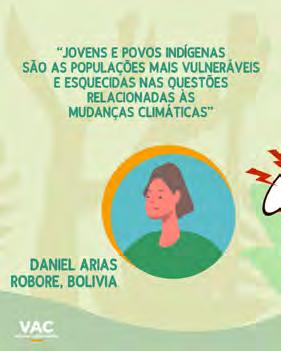

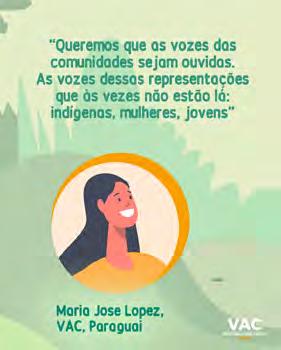

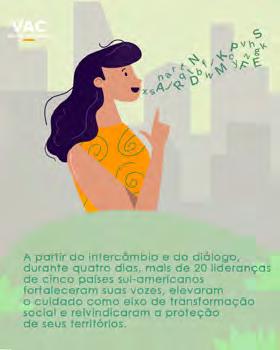
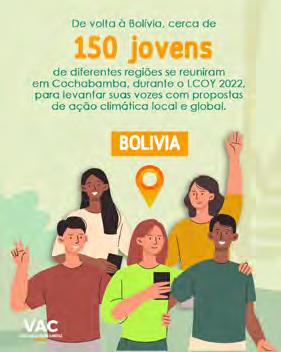


44 voices magazine #1

ON SCREEN TAPAJÓS
With cameras and cell phones, young people from Tapajós show the impacts of climate change on their territories and gain visibility in national and international awards
The appropriation of technological means and audiovisual language by traditional populations brought an original look at climate issues and the power of speech to young Tapajós activists, contributing to the Amazon being shown by the inhabitants of the region themselves. With the protagonism of these groups, the productions made it possible to create new languages and aesthetics to approach the subject by those who should be at the center of the discussion.
By
The videos began to gain notice and even awards, such as the case of the short film ‘Munduruku’s Selfdemarcation’, which tells the struggle of these people to protect their territory, and which was shown and honored at the Brasília Film Festival; the video ‘Grito Ancestral’ (Ancestral Cry), which narrates the battle of the Tupinambá people for the protection of the Tapajós River and its forest;
voices magazine #1 45 Network Actions
Samela Bonfim, from the Coalition Vozes do Tapajós Combating Climate Change
Photo: Joana Moncau
With her camera in hand, Rilcelia Akai Munduruku, of the Daje Audiovisual Collective Kapap Eypi.
Photo: Joana Moncau
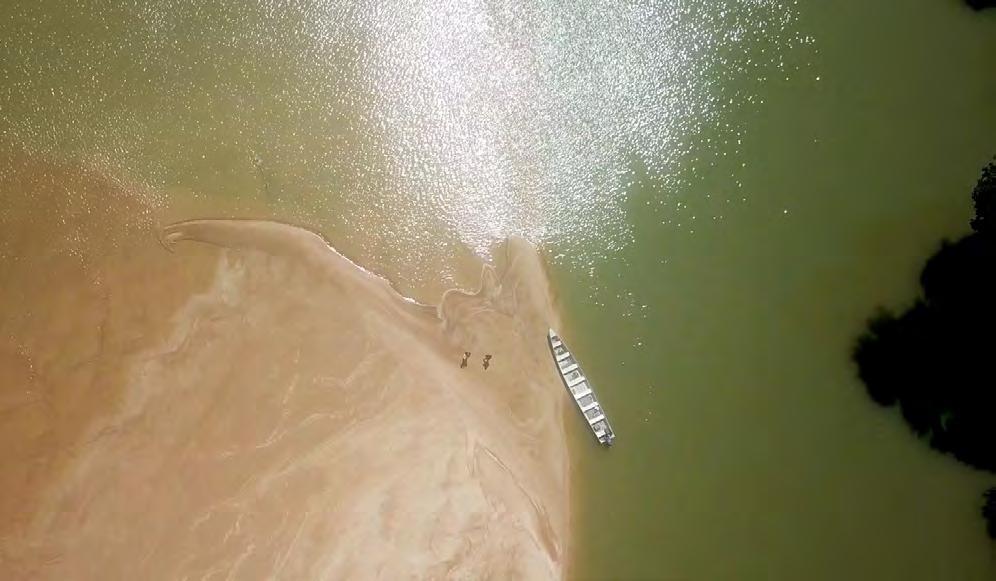
the experience of handling native bees in the Amazon; and the management of pirarucu as a climate solution. The last three were awarded in the 27@27 Contest, promoted by the VCA Program for COP 27. Through workshops and support for the qualification of audiovisual productions that have been experimented with by collectives made up of young people from Indigenous and riverside communities, the Vozes do Tapajós Coalition has been highlighting narratives of the Amazonian populations about climate change.
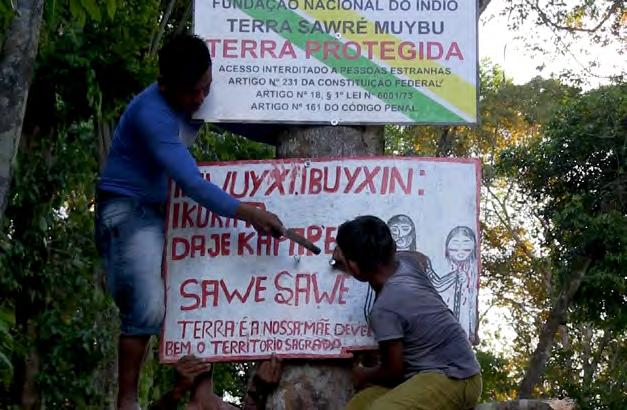
46 voices magazine #1
Boat on the Tapajós River seen from above. Photo: Audiovisual Collective Daje Kapap Eypi
Munduruku warriors fix sign on the boundary of their land during selfdemarcation process. Photo: Daje Audiovisual Collective Kapap Eypi
Strengthening of awardwinning movements through debates on climate change.
By incorporating the debate on climate change into their agendas, six communitybased organizations were strengthened in 2022 by representing traditional and Indigenous populations in the Tapajós River basin region.
Traditional and ancestral knowledge combined with technical and scientific expertise allowed a significant deepening of local populations about the grave threats to which their territories are subjected.
Collectives and movements increased mobilization and engagement in defense of socio-environmental solutions to overcome the climate crisis through the connection between local and global knowledge, realizing that the main ones impacted by the climate crisis are the traditional territories that depend on the forest for survival.
Despite the Amazon being at the center of the global debate on overcoming the climate crisis, this debate sometimes still excludes local actors from the struggle for environmental conservation, such as Indigenous peoples, riverside communities, extractivists and family farmers, among others. In this sense, the insertion of the climate crisis agenda in the debates of the social movements

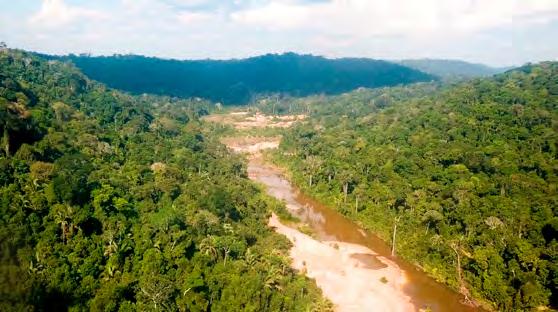
of the riverside communities in the Tapajós region allowed the understanding of the leading role that these movements have in this fight through a shared agenda based on the demands of the Amazonian communities.
This is the objective of the Vozes do Tapajós Coalition formed by the Saúde e Alegria Project, SAPOPEMA, TapajósArapiuns Indigenous Council - CITA, Rural Workers Union of
Santarém - STTR, Tupinambá Indigenous Council - CITUPI, Suraras do Tapajós Association and Audiovisual Collective Daje Kapap Eypi Munduruku, which has been promoting mobilizations in the territories, carrying out activism actions focused on the climate agenda and training events with leaders of movements and grassroots organizations and training, thematic guidelines and funding for the production of videos. V
voices magazine #1 47 Network Actions
Flag of illegal deforestation in Indigenous Land. Photo: Coletivo Audiovisual Daje Kapap Eypi.
YOUTH ON THE MOVE
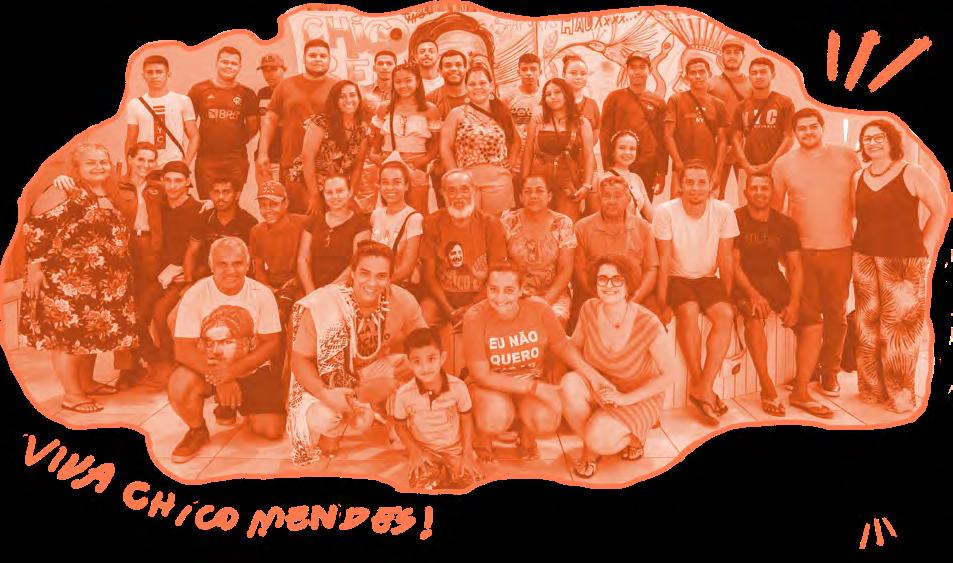
Young people from Acre join to form the Comunic(A)tiva Network Coalition to promote communication and activism in the socio-environmental struggle.
LBy Rose
aiane da Costa Santos inherited her parents’ engagement in the fight for the rights of Indigenous peoples living in the forest. Luiris da Silva Carvalho is proud of his family history and of recognizing himself as a traditional rubber tapper. Raylane Onofres Rodrigues has photography as a tool for socioenvironmental activism in her hands. And André da Silva Marciel’s ideal is to produce without destroying nature. These four young people have in common the desire to keep alive the territory they inhabit: the Extractive Reserve (Resex) Chico Mendes, which extends over 9,705.7 km² across seven municipalities in Acre and, despite being an international reference in sustainable development, leads the ranking of most deforested protected areas in Brazil.
Now they are at the forefront of defending not just the Amazon, but the planet. Laiane, Luiris,
48 voices magazine #1
Farias, from Xapuri
Photos: Moisés Muálem/WWF-Brasil
Young people from Acre participate in Comunic(A)ctive Network Coalition trainings
Raylane and André are part of the Voices for Just Climate Action (VCA) program, which in December 2022 brought together twenty-six young people in Xapuri, Acre, for a cycle of training. There were several workshops, such as the theater one “What we are made of and what we will become” with Marcos Luanderson, actor, and dancer from Acre; “Technical Communication and Emotion, how to develop both senses. I think, then I write and share” with Thanee Degasperi, manager of social networks for the Mídia Ninja collective; and “Stencil” with Subvertivo Lab, an artistic, creative, and experimental laboratory. Other activities involved topics such as the role of each person in the fight against the climate crisis and the importance of youth prominence.
Thanee applied a free learning process for young people to understand themselves as communicators and multimedia citizens. “With a cell phone in hand, they manage to be videographers, photographers, copywriters, editors... Today we have ‘media mass’ not the ‘mass media’ which few families oversee,” she says. “We have a mosaic of partiality where each one can bring their point of view. Everyone can be a communicator and create media content. The result will be the emergence of many narratives, the verve of communicators within territories that can understand themselves as agents of transformation.”
André, who is 20 years old and lives in the portion of the Resex Chico Mendes located in the municipality of Brasiléia, already hopes to promote changes. “I got to know new tools that will enable me to leverage the work we already do in the community, raising awareness about seeking a dignified life in association with human beings and nature. I will be able to document and record,
not just for my community but for the world. I want to expose our way of life; how special it is to live in the Reserve. Further, I feel obliged to use these tools to make people aware of my territory, the surroundings and everywhere else about the danger we are living with the climate crisis,” he says.
The exchange of learning during the five days of VCA program activities was intense and preceded the 33rd Chico Mendes Week, which took place from December 15th to 22nd in Xapuri and Rio Branco. “This meeting showed that we are not alone,” celebrates Laiane, 32 years old. “Many young people are aware of their communities and have done important work. With each active one in their territories, we are strengthening a network for the climate.”
The activist, who carries in her DNA the fight for the people of the forest, with her mother being the first woman to join the union movement of rural workers in the region, has emerged as a young Acre leader. She participated, for example, in the panel “Connecting Climate and Social Justice to Leave no one behind,” promoted by Action for Sustainable Development during the 27th UN Climate Conference, COP27, in November 2022, in Egypt. On that occasion, Laiane presented the actions conducted in her territory for the conservation of the Amazon.
Karla Martins, from the Chico Mendes Committee, points out that the objective of the training cycle held in Xapuri was to sensitize young people
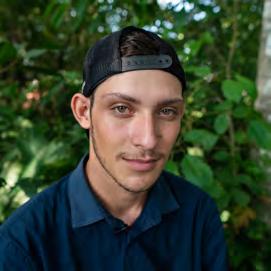
I got to know new tools that will enable me to leverage the work we already do in the community, raising awareness about seeking a dignified life in association with human beings and nature. ”
André da Silva Marciel
voices magazine #1 49 Network Actions
about the importance of communication as resistance and confrontation with the process of deconstructing the identity of the forest - to avoid the systematic erasure of these peoples that has been promoted around the world. “The idea is to leverage these young voices, the exchange of knowledge in networks, dialogue and identify the challenges, what is being done, the communication strategies used, to increasingly strengthen this role of youth,” she says.
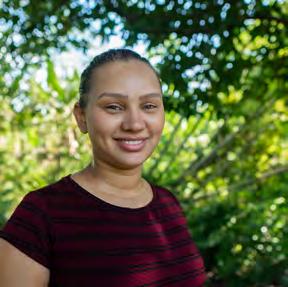
Disseminating new forms of struggle is essential for young people to feel driven to maintain the legacy of generations that came before. One of the moments that most moved Luiris during the VCA event was the meeting with Raimundão Mendes, 77 years old, cousin of Chico Mendes and one of the main living leaders of Acre. “He inspires me. He is a celebrated figure, like one of the family. He fought along with my father, alongside Chico Mendes, I am inspired by his way of being a traditional rubber tapper. Listening to his speech, I realized that I need to recognize myself as a rubber tapper. I am a rubber tapper, and I will no longer deny it. I am a Brazil-nut breaker, I love what I do,” says Luiris, 22 years old.
Raylane joins in. “Listening to Raimundão, Sabá Marinho and Leide Aquino was very moving
This meeting showed that we are not alone”
and encouraged me to carry with me the fight for social and climate justice in my territory,” she points out. The 18-year-old adds that the five days of immersion in the workshops held in Xapuri strengthened her desire to remain firm in activism. “Preserving the forest, talking about my culture with pride, where I came from, inspired me to increasingly mobilize young people in my community,” she says.
Dialogues between tradition and modernity

Listening to Raimundão, Sabá Marinho and Leide Aquino was very moving and encouraged me to carry with me the fight for social and climate justice in my territory”
Raylane Onofres Rodrigues
How to motivate the connection between modernity and tradition? Where were you at 17, 18 and 19? These questions were encouraged so that leaders and companions of Chico Mendes – such as Raimundão, Sabá Marinho, Leide Aquino and his daughter, Angela Mendes, who is president of the Chico Mendes Committee – could tell young people what it was like in the past and how the fight has been today of the oldest to keep the Amazon alive and for the peoples of the forest to have their rights respected.
Angela spoke about her relationship with her father and how her awakening to the call to preserve the forest came with the letter from Chico Mendes, written few months before he was murdered, in December 1988. Addressed to the young people of the year 2120, the utopian narrative celebrates the centenary of a world revolution that, in the
50 voices magazine #1
Laiane da Costa Santos
imagination of the environmental activist, made the planet socially fair for all peoples.
“I was called by my father’s letter, and you are here for the same reason, to take on this revolution. This struggle resulted in the Alliance of Forest Peoples and the creation of extractive reserves. He calls on the youth of this generation to do this and act for the planet. What you are doing here is a revolution in these days. A revolution based on communication, writing and speech, living experience. You are the voices in defense of the territory, of cultural identity, and this is important for your community and the world,” highlights Angela.

Listening to his speech, I realized that I need to recognize myself as a rubber tapper. I am a rubber tapper, and I will no longer deny it. I am a Brazil-nut breaker, I love what I do”
Comunic(A)ctive Network
The Comunic(A)tiva Youth Network, is a coalition formed by the Chico Mendes Committee in partnership with the Union of Rural Workers of Brasiléia (STR), the Association of Residents and Producers of the Chico Mendes Extractive Reserve in Xapuri (AMOPREX), the National Council of Extractive Populations (CNS), the Casa Ninja Amazônia and the Liga das Quadrilhas Juninas do Acre (LIQUAJAC).
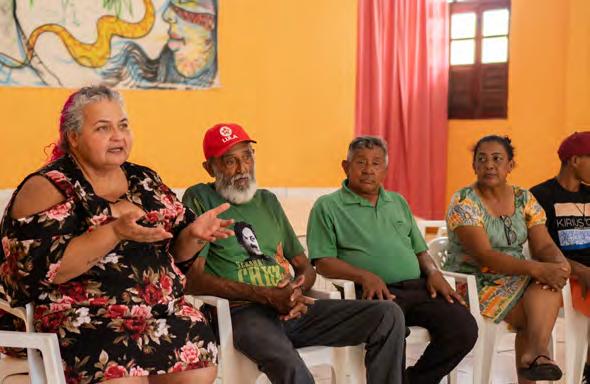
The purpose of the Communic(A)tive Youth Network is to create a robust network of mutual empowerment and common agendas. “The aim is to have a direct impact on the creation of public policies and financial contributions, establishing alliances and raising awareness in their territories and with society in general,” emphasizes Karla Martins, from the Chico Mendes Committee.
About one hundred young people from the Resex Chico Mendes in Xapuri, Brasiléia, Epitaciolândia, Assis Brasil and Sena Madureira and in the urban areas of these municipalities, in addition to Rio Branco, are benefiting from meetings and training on communication. V
voices magazine #1 51 Network Actions
Luiris da Silva Carvalho
Karla Martins (left to right), Raimundão Mendes, Sabá Marinho and Leide Aquino told the youth how the struggle was in the past and how the elders fighting today to keep the Amazon alive.
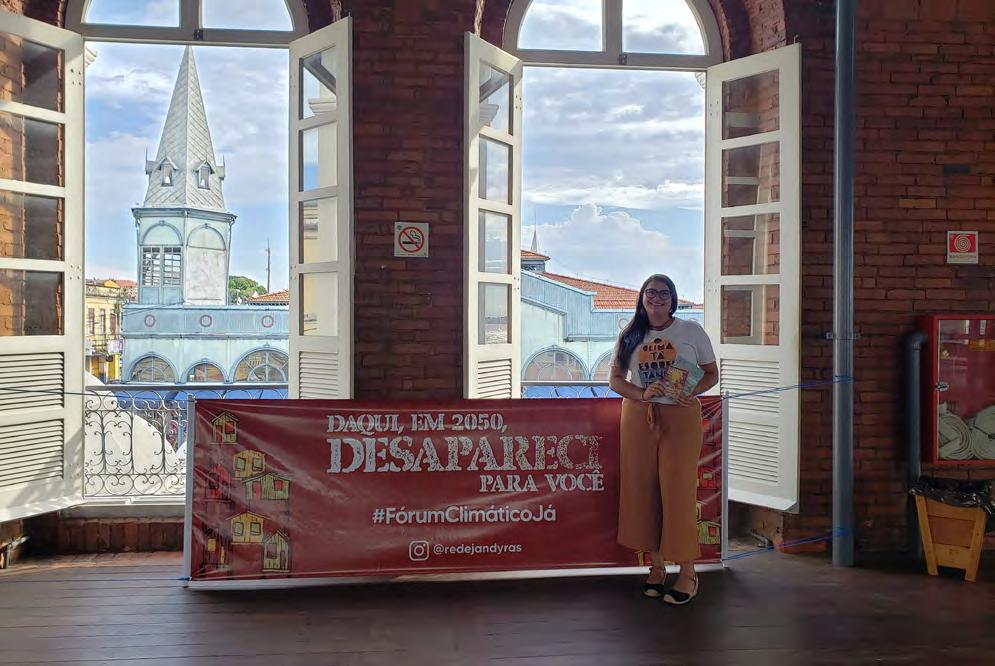
From here, I disappeared for you, in 2050
Jandyras Network highlights the risks of climate emergency in Belém and shows the urgency of incorporating the climate agenda into municipal policies.
By Jandyras Network
“f
rom here, in 1976, I waved to you”, the phrase printed on an artistic intervention at Solar da Beira, a tourist and historic spot in the capital of Pará, inspired the concept of our #ForumClimaticoJa campaign, resulting in the adaptation “From here, in 2050, I disappeared for you”. The Climate Forum campaign was launched in July 2022, during the opening of the Pan-Amazon Social Forum (FOSPA) and was quickly embraced by several local organizations that also focus on environmental issues. The campaign moved on to the sphere of advocacy, to support the Municipal Secretariat for the Environment (SEMMA) in building the Forum.
52 voices magazine #1
Articulator Tatianny Queiroz at Solar da Beira, overlooking the view of Ver-o-Peso Market, in Belém-PA. Photo: Dalissa Cabral/Jandyras.
The objective of the Climate Forum Campaign Now is to mobilize civil society and local authorities for urgent actions to face climate change in Belém and the Amazon region. The campaign seeks to raise awareness of the seriousness of the problem and the need for concrete measures to mitigate and adapt to the impacts of climate change, as well as to involve different sectors of society, such as nongovernmental organizations, social movements, universities, companies and public bodies so that together they can build more effective and integrated solutions to face climate change in the region of Belém and in the Amazon.
Several studies predict that climate change will cause rising sea levels and flooding in various territories. According to the Intergovernmental Panel on Climate Change (IPCC), global sea levels could rise by up to 1 meter by the end of the 21st century due to melting glaciers and thermal expansion of the oceans. Furthermore, the IPCC also projects that climate change could lead to a change in rainfall patterns worldwide, including the Amazon region, leading to more frequent and prolonged droughts. All these changes could significantly affect the country’s coastal areas, including Belém do Pará, which is at risk of disappearing in the coming years.
Climate change can worsen our city’s historical issues, and the great urgency in debating and seeking solutions to the climate crisis has reinforced the significant role of organizations, collectives and networks that act on the front line of tackling climate change. In this sense, the Jandyras Environmental Articulators Network, made up of women engaged in the fight for climate justice in the city of Belém and the Amazon, emerges in the territory as a strong network for local mobilization and claiming spaces for social participation in the socioenvironmental area, with the aim of one of the main objectives is to strengthen and expand
As a member of the Jandyras Network, the Climate Forum campaign is essential for us to claim the effectiveness of this space and expand the climate debate in the municipality. In addition, I maintain that the forum’s conception, construction, and operation be inclusive, participatory, and led by the population of Belém. Only then will we be able to democratize the access to such an important agenda and build climate policies that consider the vision and reality of the population”
Waleska Queiroz

participation of women in the political debate on environmental issues and in the construction of socio-environmental policies suited to the reality of the population.
voices magazine #1 53 Network Actions
To strengthen the work and support for what has developed in the territory, the Jandyras Network joined in a coalition composed of three other organizations, including the NGO Mandí, Clima de Eleição and the Moara Movement, which were also partners in the Campaign Climate Forum Now, promoted by the Voices for Just Climate Action (VCA) Program. In this way, the Coalition has played a crucial role in developing actions and projects in Belém and the Amazon about climate change with an intersectional focus, political advocacy, advocacy, social participation, territorial protection, and local leadership.
The strong mobilization of the Jandyras Network in favor of the Climate Forum has resulted in significant advances, and the actions for the Forum’s operation are still in progress. After conquering space at the municipal level, the Network worked in partnership with the Municipal Department of the Environment of Belém in building the draft establishing the Municipal Forum on Climate Change. However, to ensure greater participation by civil society, the Jandyras Network, with the support of the NGO Mandí, promoted the collective reading of the

Jandyras and Mandí with the former secretary of SEMMA, Sérgio Brazão | Coalition Jandyras at the launch of the Campaign for the Climate Forum, during the X FOSPA,
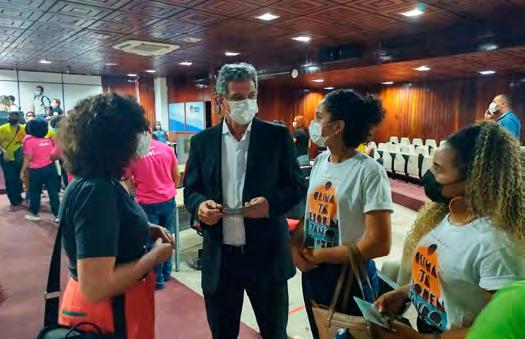

draft on February 15, 2023. The purpose of the meeting was to put into practice the Network’s demand for a transparent and participatory process from the beginning. Civil society organizations and citizens
interested in the subject could read the entire document, clarify doubts, make suggestions, and propose measures to establish a plural, democratic and participatory Climate Forum. V
54 voices magazine #1
Photos: Acervo Jandyras
in Belém-PA.
Black Women on Power, building well-living
Resistance and popular involvement are central points to facing the impacts of rampant development in the Amazon that directly contribute to climate change and environmental racism. In Maranhão, five entities are mobilizing to build collective processes of resistance together with different voices from the territories, peoples, and traditional communities of the state through the creation of the Popular Observatory of Socio Biodiversity and Climate Policy of Maranhão.
To structure the initiative, the coalition Agroecology for the Protection of the Forests of the Amazon, composed of the Agroecology Network of Maranhão - RAMA, Justiça nos Trilhos, Tijupá, ACESA and GEDMMA, held the 1st Seminar on Development & Involvement, Climate Change and Popular Resistance in Maranhão, in December 2022. With representatives of territories and entities of social movements from the countryside and the city, the event aimed to reflect on climate changes
DEVELOPMENT & INVOLVEMENT
POPULAR RESISTANCE
Representatives of territories and social movements in Maranhão state debate the climate crisis and collective resistance to support the creation of the Popular Observatory of SocioBiodiversity and Climate Policy
that affect both urban and rural areas. At the space of CUT (Central Workers Union Confederation), in São Luís, the discussion placed the major developmental projects, which continually disregard the territorial and environmental rights of traditional peoples and communities in the state, as the primary causes of conflicts. On the other hand, it is these peoples and communities that mostly maintain the natural environment conserved through their traditional way of life.
Through the different speeches and experiences from various territories, the meeting provided the exchange of knowledge and reflection on climate change and reinforced the importance of the union of diverse social actors in the fight to preserve the environment.
voices magazine #1 55 Network Actions
By Ingrid Barros, from the Maranhão Agroecology Network – RAMA and Raimundo Alves, from the Agroecology Coalition for the Protection of Forests
Photos: Ingrid Barros - Arquivo Rama 2022
The climatic consequences of contemporary capitalism
At the opening table, the debate revolved around the tendency of neoliberalism to turn everything into a commodity, including nature, and how climate change has directly impacted communities’ production periods.
Cintia Brustolin, professor at the Federal University of Maranhão (UFMA) and researcher at GEDMMA, highlighted that capitalism makes us think that nature and human beings are separate. Faced with this crisis, we are entering a new climate regime where nature is seen as a political actor
“It is necessary to change the mentality that nature is cheap and negotiable and understand that the Earth is our common home, which implies preserving the environment and protecting the communities that depend on it”.
The capitalist advance in the Maranhão Amazon
In contrast to the frantic development of agribusiness and enterprises, Máxima Pires, leader of the Rio dos Cachorros community in the rural area of São Luís, declared that her community does not consider land as a commodity and defends the sacred territory because it

Cindia Brustolin, pesquisadora e professora do GEDMMA
“It is necessary to change the mentality that nature is cheap and negotiable and understand that the Earth is our common home, which implies preserving the environment and protecting the communities that depend on it” has a sense of belonging and respect that must be preserved for future generations.
Máxima also highlighted the importance of community unity in the fight against these developments and affirms that it is essential to trust each other to be able to resist. “The struggle to protect the environment and the earth is vital for life”.
Horácio Antunes, professor and researcher at GEDMMA, stated that it is necessary to change the thinking of managers about traditional communities, who consider their ways of life as something archaic, and emphasized that we cannot face climate change without changing this thinking.
56 voices magazine #1
Guests at the panel “Main forms of resistance and organization in the face of capitalist advance in Maranhão”.
“We do not want to go extinct. Not only as individuals but also as a form of social organization, as it ensures the planet’s survival. The destruction of ways of life is a sign of the destruction of the planet”.
Forms of Resistance and Organization in Maranhão
In the last round, women were in focus. Female leaders of traditional communities, such as coconut breakers, ‘quilombolas’ 1 , Indigenous peoples and fisherwomen, highlighted how they have resisted violence, racism, and environmental degradation in their territories.

Guests at the panel discussion
“Structural changes and climate consequences of contemporary capitalism”
A possible future
Maria Alaídes, coconut breaker and general coordinator of the Interstate Movement of Babaçu Coconut Breakers - MIQCB, reported how they managed to organize themselves and resist privatization and oppression within the capitalist system. Through political battle with mobilization in public demonstrations, articulation with other social movements and advocacy and creation of spaces for dialogue, the breakers succeeded in strengthening and creating production alternatives, such as the cooperative.
Vanusa Guajajara, Indigenous from the Pindaré IL, in Santa Inês (MA), reflects on how the resistance against the privatization of coconuts shows that organization and cooperation can be meaningful to combat the interests of capitalism. Furthermore, valuing spirituality and ancestry is crucial in strengthening the identity of communities and their relationship with the land.
“When we go to the meeting with Vale [do Rio Doce Mining Company] and sing our chants, they are afraid of us. I tell our relatives that we do not need licenses because the territory is ours, they are the ones who need a license”.
During the two days of the meeting, representatives of quilombola and urban Black communities, coconut breakers, extractivists, fishermen and Indigenous people pointed out the different ways they feel climate change in their territories and the consequences on the quality of life with changes in the soil, in the air, rivers and seas.
The rains, floods and landslides do not affect everyone equally. These climate tragedies mainly affect Black, traditional, and Indigenous communities, victims of invasions of their territories, unstoppable consumption of natural resources and environmental racism. However, these very communities, based on their traditional knowledge, care and management of the land, are the possibilities for a future.
Capitalism fragments the struggle and subsequently dominates. A green economy is a form of usurpation of territory. Expanding the range of voices and discovering spaces where demoralization cannot affect us. Finally, it is necessary to think about processes that guarantee greater autonomy, especially in a State that often does not allow this. Only in this way can we achieve climate justice closer to the reality of the territories. V
voices magazine #1 57 Network Actions
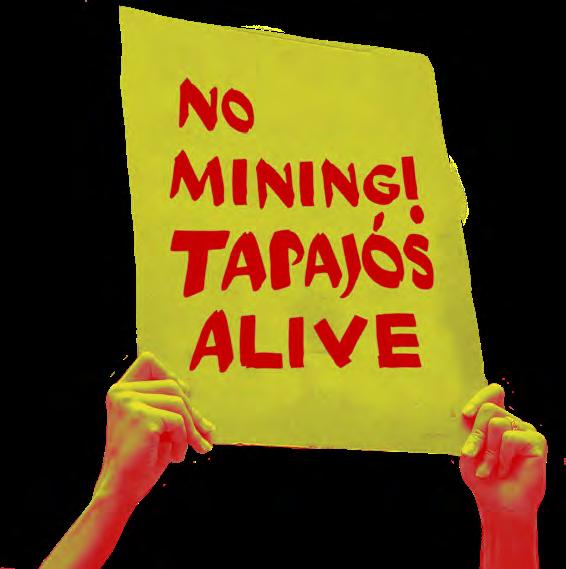 By Alice de Matos Soares
By Alice de Matos Soares
Lindon Johnson Pontes Portela
Maurício Alves de Sousa
Kamila Mayara Sampaio Souza
Lucidalva Cardoso do Nascimento
Raimundo Carlos Ferreira Alves
(Amazonian Socio-Environmental Militance School - EMSA team e militants from Tapajós Alive Movement - MTV)
AMAZONIAN MILITANCE EngagementandstrengtheningofSocial MovementsindefenseoftheTapajósriver
basin: the case of the Amazonian SocioEnvironmental Militance School - EMSA
Faced with the problems of disputes and threats to the Tapajós territory in recent years, such as agribusiness, mining, deforestation, and prospecting, among others, it was perceived the need to create a training space to strengthen and engage militancy in the region, thus the Amazonian Socio-environmental Militance School – EMSA was born.
EMSA, an initiative of the Tapajós Vivo Movement - MTV in partnership with the School of Activism, took place in 2022 in the NÓS Coalition - Education, Communication, and Popular Mobilization in Defense of the Juruena and Tapajós River Basins, formed by the Tapajós Vivo Movement - MTV, School of Activism, Tapajós de Fato, Movement for Popular Sovereignty in Mining - MAMLower Tapajós/Amazonas Collective and Juruena Vivo Network.
EMSA, which uses a popular teaching methodology, proposes a more horizontal, participatory, and democratic education which values dialogue and the exchange of experiences between people. In this sense, it emphasizes the importance of education as a collective construction process of knowledge and

58 voices magazine #1
action, valuing popular and local knowledge and incorporating critical and reflective perspectives on social and environmental reality. (FREIRE, 2013).
The school is the result of actions and partnerships with internal and external subjects from the territory of the Tapajós basin, who are concerned with the progress of the large projects already implemented and those that are in planning. Consequently, EMSA is thought of as a “tool to strengthen the struggles of local actors through grassroots training”.
EMSA has been idealized and dreamt of since 2019 in the Encontro das Águas. The meeting gathered in Santarém-PA movements and organizations from the Tapajós river basin: Juruena and Teles Pires, with participation from the Madeira, Amazonas, and Xingu rivers. At the meeting, the Tapajós basin and the lives of people in the region were the subject of discussion regarding threats. Ways to strengthen the struggle for the lives of the people of this basin were also considered. Therefore, in the indications of the joint actions, the proposal, and the commitment to grassroots training of the militants of these territories appeared. Later, at the meeting to consolidate the activities in Sinop/MT (2019), a proposal was prepared for a training school for grassroots militancy in the Amazon. Amidst this scenario, today Amazonian Socio-environmental Militancy School (EMSA) emerges.

EMSA’s mission is: “To offer knowledge and sharing of knowledge (scientific and popular) to strengthen the critical awareness and commitment of the various residents affected or threatened by the projects that destroy the territory and peoples of the Amazon and the strategies of the joint struggle of the three basins of the Tapajós”.
EMSA’s mission is: “To offer knowledge and sharing of knowledge (scientific and popular) to strengthen the critical awareness and commitment of the various residents affected or threatened by the projects that destroy the territory and peoples of the Amazon and the strategies of the joint struggle of the three basins of the Tapajós”.
training groups, such as Sociopolitical, Mobilization and Agitation and Popular Communication. The modules had the participation of several collectives and urban and traditional social organizations, always paying attention to gender equity, and guaranteeing cultural diversity, expanding the debate on challenges and tools for our resistance.
In the 2022 training courses, it was possible to bring students to spaces for major debates. Examples of this were in May 2022, with the participation
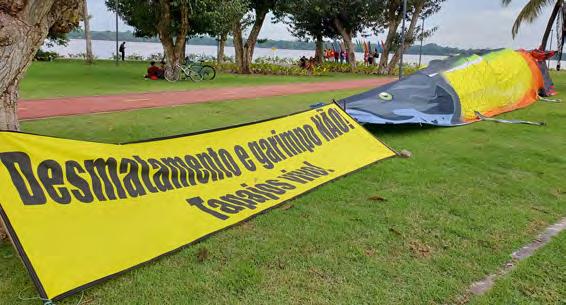
In 2022, EMSA held six in-person modules and two online seminars, debating
voices magazine #1 59 Network Actions
Scenographic Pirarucu Fish and Banner during X FOSPA
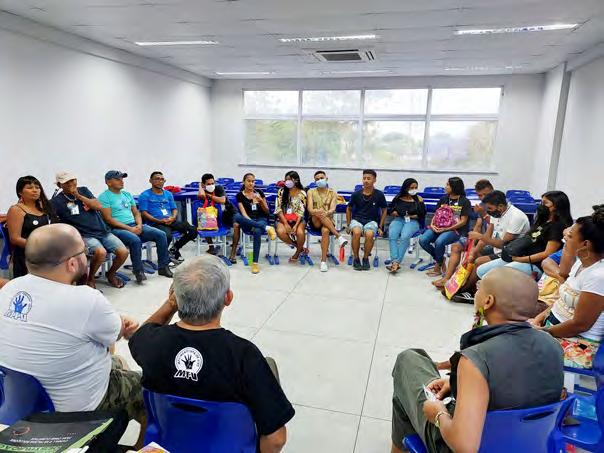
Another important activity was the participation in the X Pan Amazon Social Forum - FOSPA in Belém. EMSA’s objective at FOSPA was to create an exchange and a training space on Popular Communication. In addition, the NÓS Coalition held a conversation circle to discuss climate change and transform territory in the Juruena-Tapajós Basin. The presence of the coalition and EMSA was also marked by the presence of a large scenographic pirarucu fish and banners at the opening march of FOSPA. It was a very positive experience for the students who participated for the first time in the largest international pan-Amazonian forum, organized by the Social Movements of the Amazon, having the opportunity to exchange and connect with the many Amazons inside the Amazon.
of students in the Public Hearing that aimed to discuss the impacts of mercury contamination in the Tapajós basin and the creation of the Forum to Combat Mercury Contamination. For most, it was the first time in a Public Hearing, as well as participation in direct action, with the partnership of the School of Activism, Juruena Vivo Network and Tapajós de Fato.
Previously, there was a division into groups to participate in the Public Hearing, managing to organize the action in three stages: (1) communication, using mass publicity shortly before the hearing, as well as a call to give visibility to the audience with photos and denouncements on site; (2) preparation of speeches for the audience and production of posters always emphasizing the dangers of mercury contamination, the importance of the Unified Health System - SUS and mass testing of mercury levels, as well as the expansion of scientific research in the Tapajós Basin; (3) Artivism action to raise awareness and make visible mercury contamination.
In this sense, Popular and Environmental Education is a critical educational approach that aims to promote short-term awareness and long-term awareness of social transformation through the active participation of people in their education and the search for sustainable solutions to environmental issues (GADOTTI, 2016). The first year of the militancy school was essential for experimenting with methods, exchanging knowledge, and strengthening organizations and movements that show resistance inside our territory. We hope that this 2023 year, we can reach more people and instigate the fight for the good life of all. V
FREIRE, Paulo. Pedagogia do oprimido. 58. ed. Rio de Janeiro: Paz e Terra, 2013.
GADOTTI, Moacir. Pedagogia da Terra: Ecopedagogia e Educação Sustentável. 5. ed. São Paulo: Editora Peirópolis, 2016.
60 voices magazine #1
Scenographic Pirarucu Fish and Banner during X FOSPA
WANTED Activists
The first activism award in Brazil maps and makes actions visible, encourages social participation and shows the new activist faces of the country.
By Megaphone Activism Coalition

what were the most impactful activisms of 2021? It is hard to say off the top of your head, you know? But you do not need to fry your brains too much, because, since last year, the Megaphone Activism Award has been celebrating the main activist actions in the country and collaboratively mapping much of what happened that was most mobilizing, innovative, and inspiring in this universe of activism.
“The Megaphone Award contributes to the visibility of activist actions, encouraging the practice of activism as a catalyst for social transformation and the emergence of new agents in activism, mainly young people and women, in the debate and in action to combat the climate crisis and causes related issues,” says Jonaya de Castro, from the Megaphone Activism Coalition. “The award gives legitimacy to activism in the current political context, both in urban centers and in the digital space, with a main focus on socio-environmental activism, but without being restricted to it alone”, she adds.
In the first edition, in 2022, there were more than 700 registrations of activist actions made in 2021 throughout Brazil. In this second edition, in 2023, the number reached 951 entries for actions carried out in 2022. Of these, 70 are nominated as finalists in 14 different activism categories. The evaluation is carried out by a specialized jury and the entries are evaluated according to 3 main criteria:
main criteria
Impact on the cause to which the activism is directed and on the public debate on the subject.
Ability to convey the message creatively and coherently to the theme.
Ability to inform, mobilize and inspire others through activism.

voices magazine #1 61 Network Actions
“The Megaphone Award is also a way of recording the history of activism each year, so to reach the maximum number of actions and regions of the Brazilian territory, people are allowed to register not only an action of their own or their collective but also actions that they have seen or heard about and that they think deserve to be registered”, reinforces Digo Amazonas, also from Megaphone Coalition. “Every activist action is important, big or small, with many or few people. Anything goes!”
THE ACTIVISTS
Among this year’s winners are:
• Direct Action Category - Rabetaço in Defense of the Arapiuns River, promoted by the Collective Guardians of Good Living.
• Poster Category - Justice for Bruno and Dom
• Social Network Profile CategorySamela Sateré Mawé
• Documentary Category - The Territory
• Megaphone of the Year CategoryTxai Suruí
• Jury’s Prize Category - Marina Silva





To see all the 2022 and 2023 nominees in the 14 categories, visit the website. megafoneativismo.org




The Megaphone Activism Award is organized by the Megaphone Activism Coalition, formed by Pimp My Carroça, SocioEnvironmental Institute (ISA), Greenpeace Brasil and Engajamundo.
In addition to the award, the Coalition promotes workshops on Climate Emergency; Project development; Engagement and Mobilization; and Art Activism. It also develops a microgrants program for carrying out activist actions throughout Brazil. See some of them in the Art Mood section.
Follow @megafoneativismo
62 voices magazine #1

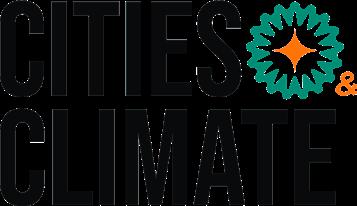
The collaborative compilation of the Infographic on climate change and the urban agenda has been applied in schools and universities in the region and is available for download in 3 languages.
By Amazonic Voices Coalition: Urban Engagement on Climate Change
until recently, the climate issue was commonly seen only as an environmental issue, as part of the “green agenda”. After all, the key issues facing cities, the so-called “urban agenda”, were different, related to access to land, housing, urban services, and other related issues.
To bring these themes closer together and show that climate change needs to be part of the urban agenda, Interação Network and SOMECDH formed the Urban Engagement Coalition in the Climate Agenda: Amazonian Voices. After all, the impacts of climate change are felt both in rural areas and in cities.
To make this relationship even more evident, the Coalition created content that brought the two realities closer together, demonstrating that a series of phenomena observed in Amazonian cities originate or are related to climate change.
Based on a foundational text, the Coalition discussed the issue of climate in the urban agenda with groups of multipliers from the four communities where it operates, supporting community organization processes while working on the theme of climate change: Terra Firme and Cotijuba in Belém - PA, and Maracanã and Maipiri in Santarém - PA.
Based on the visions and realities of these communities, the Cities & Climate infographic was created, and is available in 3 languages (Portuguese, English and Spanish). This material has impactful, clear, and objective content and is accessible to schools and universities nationwide.
Discover part of the infographic on the following pages and download the material through the link. Let us act together! V
voices magazine #1 63 Network Actions
download the infographic here

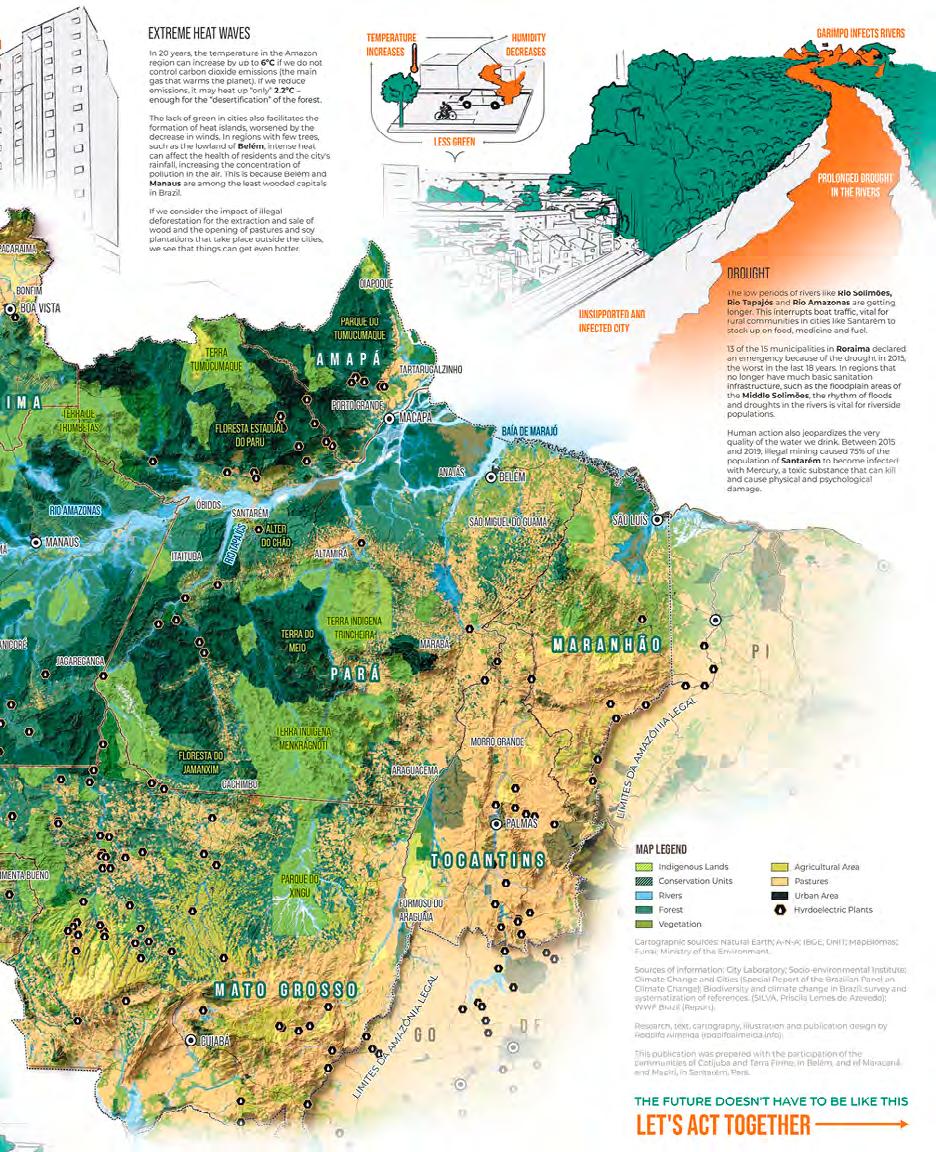
CLIMATE
Climate Agenda for Belém publication
The
Climate Agenda for Belém, produced by Jandyras Coalition is a systematization of data, analyses, and proposals for actions of mitigation and adaptation to the effects of the climate crisis in Belém. The objective is to strengthen a Climate Agenda for Belém that guides and urges the public authorities to act in this sense. The material can serve as inspiration for other municipalities.
Download here

Feed on climate knowledge!
“Xibé” is a mixture of cassava flour and water, to drink or eat. Also known as “jacuba”, it is a symbol of the richness of Amazonian food, present in the daily lives of many riverside inhabitants, native people and sustainable traditional extraction activities. Devour this xibé and enjoy!
PODCAST Bulletin Fala Juruena
This bulletin is a podcast by Juruena Vivo Network, collectively created and produced by several hands, bringing information, news, and alerts about the Juruena sub-basin and the local perspectives of the subjects who live and work in this region, expanding their voices beyond their territories. In episode 4, the bulletin carries information about climate change, environmental racism, and climate justice, as well as the perception of those who live in the territories of the region on how climate change is being felt and dealt with. The Juruena Vivo Network is part of the “NÓS” Coalition.
Access: YouTube Spotify

66 voices magazine #1
Who needs Climate Justice in Brazil? publication
Stemmed from a series of reflections, the publication by the Climate Observatory points to the need to understand what climate justice really means. Seeking to pave the way for this conceptualization from intersectional perspectives, we heard some of the voices that featured the theme in the country to understand what their colors, races and ethnicities are, their paths of struggle, life journeys and actions, among other perspectives that, when analyzed jointly, show the multiple realities and injustices experienced by these people.
know more

PUBLICAÇÃO

PODCAST Raízes
This is a podcast that brings popular coverage of the mineral case in the region of the lower TapajósAmazonas. The podcast is a production of the Movement for Popular Sovereignty in Mining (MAM under Tapajós-Amazonas), within the “NÓS” Coalition
Access here
A Data Ecosystem in the Amazon: Preliminary Investigations
Data is key to climate action and rights advocacy—but who produces, uses, and owns this data? To start a debate around this issue, Open Knowledge Brazil (OKBR) launches the e-book “A data ecosystem in the Amazon: preliminary investigations” drafted collaboratively with partner organizations of Data Ecosystem Coalition.
In this mapping, it was pursued an understanding of how collectives and organizations operating in the Brazilian Amazon form this “data ecosystem”, with different strategies and practices of use, publication, and data generation in socio-environmental agendas — with a focus on climate change, territorial protection, and inequalities.
Access here
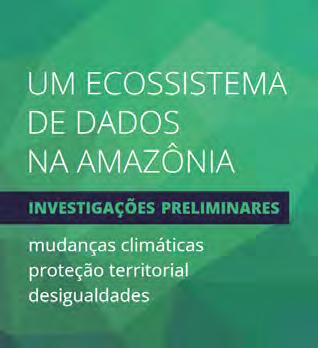
voices magazine #1 67
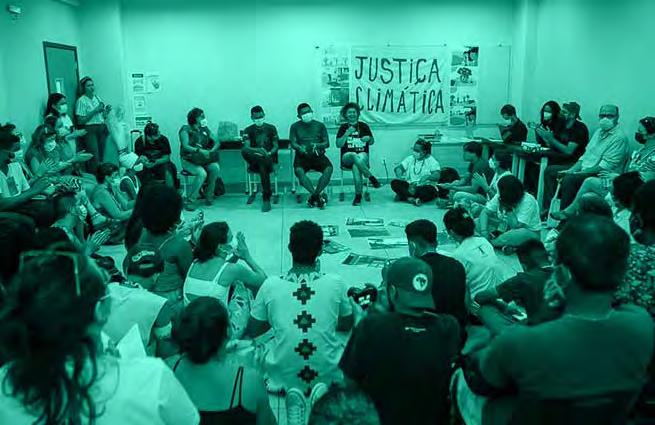
Do you want to contribute, support, participate and get involved with VOICES Magazine and VCA?
68 voices magazine #1 Round talk
Justice:
comunicacaobr@voicesforjustclimateaction.org
“Climate
Amazonian Views and Voices”, promoted by VCA at the X Pan Amazonian Social (FOSPA) Email
VOICES has traveled miles and miles to reach you!
Let's make the Voices reach further?
Post a photo with your magazine and share it with #VACBrasil and @wearevca
The Voices thank you!
jamboestudio.com
voices magazine #1 69







 Representatives of the 13 coalitions, the VCA Brazil Regional Team and VCA Brazil Regional Team and Global VCA during the II VCA Brazil Partners Forum. Photo: Negritar Produções
Representatives of the 13 coalitions, the VCA Brazil Regional Team and VCA Brazil Regional Team and Global VCA during the II VCA Brazil Partners Forum. Photo: Negritar Produções









 Sineia do Vale, Head of Environment Department of the Indigenous Council of Roraima (CIR).
Sineia do Vale, Head of Environment Department of the Indigenous Council of Roraima (CIR).

















































 By Alice de Matos Soares
By Alice de Matos Soares
























